#days without nonsense in the ax - zero
Text
Existentialism in Six Parts
Or: Why The Fuck Are We Here?
A Philosophical Consideration of Life, Death, and The Weird Shit In Between
PART ZERO: WARNING
What follows might be a lot -- consider this a warning for all things -- hopefully duetted with occasional levity and even a positive conclusion in an attempt to brand myself with unyielding charm and biting wit. Even so, keep in mind that I did say “all things.” After all, aren’t there more things in Heaven and Earth, reader, than are dreamt of in our philosophy?
PART ONE: WHAT IS SCARIER THAN DEATH?
I feel like most people are afraid of death. Who wouldn’t be? We are all afraid that one day we will enjoy life so much that we will have something to lose.
For me, that fear is more of a dull thump in my temple.
The sharp pang in the forefront of my mind, the fear I can’t shake, is that one day I will no longer be afraid of death. One day, there will be so much that overshadows the things I have to lose that I won’t be afraid to lose them anymore.
I mean honestly, how is a creature that is able to predict its own inevitable demise even meant to exist? How can anything live an unfettered existence knowing what’s to come?
Or rather, knowing what’s to come and then not knowing what’s after that?
We can’t. We just can’t, so most of the time we keep ourselves from thinking about it in any meaningful capacity on purpose just so that we can stomach our own beating heart.
Most of the time, we build our walls up so high and so thick, plastering brick after brick so that no axe can chip at it because if we don’t, the dam will break and instead of water we’ll have waves of black ooze, existential sludge induced by our own thoughts.
Or maybe that’s just me.
PART TWO: DOES ANYONE DESERVE ANYTHING?
More than the idea of life and death, I struggle with the idea of “fairness,” by which I mean I struggle with the absence of it.
I don’t know why it’s fair that I get to live a comparably good life. I certainly earned some of the good things in my life, but I didn’t earn being born somewhere peaceful and safe, into a white, middle-class household to parents who love and support me.
I didn’t earn being generally physically healthy. In fact, anything about me that is physically unhealthy is a direct descendent of choices I have made for myself.
(See: Caffeine, nicotine, and not eating for years.)
The fact that I have the time, the resources, and the capabilities to reflect on any existential nonsense means that I practically have it made. So what did I do to deserve it?
And even though I have it, does it save me from suffering?
Nothing changes the fact that even a comparatively good life, a life misted by or drowned in privilege, necessitates the acceptance that the people we love will eventually die.
No matter how wonderful the life given to us, we will one day have to watch ourselves and everyone around us decay; one day our bodies and, maybe more importantly, our minds will scatter into a million pieces and be picked up by a world that doesn’t slow down just because we can no longer keep up with it. And even then, that is only if we’re lucky enough to live long enough to watch it happen. If we aren’t hit by a bus or dropped by an aneurism.
But, (spoiler alert!) no matter how or when it happens, we will one day lose everything.
In the meantime, our only option is to hang out and ask ourselves why.
How is that fair? Why does anyone deserve that?
PART THREE: WHY GIVE A SHIT ABOUT ANYTHING IF IT ALL GOES AWAY?
I did, at one point, consider myself a nihilist. Mostly because I was thirteen, filled with Redbull and Tumblr and puberty-granted angst and I thought it would make the cool, moody kids like me.
But now, in the I-Am-An-Adult-But-I-Still-Feel-Like-I-Know-As-Little-As-I-Did-Then stage of my life, I really think I was overcompensating. I did, at one point, consider myself a nihilist because I also did, and still do, think that most things matter. A lot. I think most things are actually really profound and special, but that’s exactly what scared me.
It’s scary to assert, in the face of a meaningless void where we are but one speck of dust in an infinitely expanding cosmos, that something might mean something to you.
It’s scary to consider the fact that one day you might never get to look at those somethings again. It’s scary to look at the trees, or the sunset, or the stars, or the love of your life, and know that you won’t have them forever even though you love them so deeply.
It’s scary, fucking terrifying in fact, to understand that eventually there will be no more anything: No more climbing into bed with clean sheets, diving into the sea, tasting the first sip of coffee in the morning, feeling wine-induced euphoria, touching or being touched, running fast, biting hard, screaming loud, laughing louder. The fear is debilitating.
How can the joy of having not be overshadowed by the fear of not having?
How can the joy of existing not be overshadowed by the burden of understanding not existing, the burden of having a weird body hanging off of you, the burden of too many emails about too many things that might not actually matter in the end?
How can we possibly keep ourselves from spiralling into a pleasure-seeking, never-finding, Dorian-Grayian husk of hedonism? Realistically, we can’t. That’s scary, too.
But it’s more complicated than that, isn’t it? There’s more left to account for.
PART FOUR: WHAT OF THIS SHITTY WORLD?
What of the melancholy, the boredom, the sadness, the blinding rage, the jealousy?
What of the, and I mean this very seriously, real evil? What of the suffering?
What of the bare hopelessness, the hunger, the sickness, the torture, the war, the entire world on fire? There are entire nations built on graveyards or things worse than graveyards. There are entire nations turning into graveyards or things worse than graveyards.
What of the people who can be monsters, who are monsters right now as we speak, who have been monsters since the dawn of man, and who will be monsters until we are all dust?
What of the universe’s indifference to those monsters?
Worse yet, what of our indifference to them?
What the fuck do we do with that?
I mean, we can write about them, read about them, recite the stories about them low and sober in the candlelight or loud from a podium, but sometimes I feel like if stopping it truly mattered to any of us, we would drop everything and do something. Anything.
But most of us don’t want to do that.
Is it selfish that most of us like our lives -- even when they are scary or confusing or plagued by fears -- and don’t want to give them up?
Is it selfish to not give them up, whether physically giving up our corporeal machinery that keeps us breathing or metaphorically giving up our time and our money that we use to try and create a more meaningful existence for ourselves?
I don’t think admitting that makes us bad people, but it probably doesn’t make us good people, either. I really think it just makes us people.
Sometimes we don’t need extra money, so we give it to someone who does. We vote. We give blood. We go out of our way to compliment people or be nice to the barista at our favorite coffee shop. We write shit like this and hope that it helps someone.
We contribute in the ways we know how, in the ways we can. We try to write new verses for poems, stitch new patches into the felt of the universe hoping to make it a little bit more beautiful, a little bit more complete. But is that ever really enough?
PART FIVE: IS THAT EVER REALLY ENOUGH?
I really think that might be. I try not to be in the business of unnecessarily miserable conclusions. Once you find yourself in the midst of them, they start to color everything with their shade of pale nothingness and they tend to bring about the idea that the more grim something sounds, the more truthful it is. Screw that.
There are terrible things in the world, so many that if you could see them all at once they would break your heart. But, fuck, we’re the only things that we know of who can hope.
Find. Create. Catalyze meaning where there might not be any.
By being overly cynical about the state of the universe, we do a disservice to the infinitesimal chance that there is so much beauty in the world that it will take your breath away.
If we, as people, create meaning and if truth is subjective, we are left with two options that are completely artificial: Either the world is beautiful and wonderful simply because it can be, or the world is a deep, hellish cesspool of suffering simply because it can be. If that’s the case, doesn’t it make more sense to hone in on the man-made truth that is quiet and, in some rare moments, truly joyful?
Maybe, just maybe, you can’t have one without the other. Maybe it isn’t a matter of choosing the “right one,” or pinning down a specific point on a map, or finding the sweet spot in the middle of the spectrum. Maybe it isn’t a spectrum at all. Maybe everything is beautiful and everything sucks, everything is order and chaos, everything is life and death.
Maybe Heaven is a prison. Does that make it any less Heaven or any less prison?
The only thing we know is this: Everything is notable and important because we make it so; because we experience it, we articulate it, and we share it; because we write showy, meandering pieces about it to publish for other students who know just as little as we do about all of the maybes.
We know intimately what it means to live, what it means to suffer, and what it means to die.
But in the midst of that cosmic sleight, isn’t there something so special about arranging the resulting turmoil for our own minds? Isn’t it so beautiful that we are even alive to think about how shitty it is to be alive?
What a gift it is to be fully aware of all this and still choose to, in our own little pockets of time and space, seek out happiness for ourselves and those around us.
PART SIX: CAN THERE REALLY BE A CONCLUSION?
While preparing a, hopefully meaningful, final monologue, I didn’t know quite what to say. There is both so much and so little to focus on. But what I keep coming back to is one idea:
Everything is going to be fine; it will not be perfect and it will be painful, but it will be fine.
“Fine” might be less of an absence of feeling than a resolution of them or it might be the most comforting lie we can tell ourselves, but it might also be the most beautiful truth we can muster. The closest thing to the middle of the spectrum that is not a spectrum.
“Fine” might just be everything and then some.
There will always be death and we will always be aware that it is looming over us like a Jenga tower about to topple. Nothing will ever be fair, but in spite of that,
everything will be fine.
1 note
·
View note
Text
Ease the Dawn Chapter 6

A/N - Thank you, everyone, for your comments, likes and reblogs. Let me know if you would like to be tagged. Chapters 7 and 8 likely up next weekend.
Pairing - Ivar and Aethelswith
Chapter - 6 of 18
Amusement pulled at the corners of Ivar's mouth as he tore meat from a small greasy rib bone. Slouching casually, he rested on an elbow in his wooden chair under the canopy of the tent used to meet with his men.
"Are you listening?" Hvitserk asked.
Following Ivar's line of sight, Hvitserk saw the Princess standing down on the rocky shore of the stream among a few thralls. Her face was locked in concentration as the women seemed to be showing her how to bait a fishhook.
"Ivar," Hvitserk repeated, running his hand through his hair.
"Yes, I am listening." Ivar's lifted his cheek as if feeling the breeze on his skin, the smile was now gone from his face.
"You had King Alfred's scout turned away. Why? What is the plan?"
"I am waiting."
"For?" Hvitserk raised his hands in question, his expression showed his confusion.
"Tactics take time. Let the king's concern for his sister..." pausing, he searched for the appropriate word, "fester." Picking up another rib, he began tearing off the meat with his teeth.
"Why not tell the King, now, that you want the area on that side of the river. Like we discussed."
"Like we discussed, like we discussed," Ivar mocked, irritated. "I will."
"What are you waiting for?"
Sneering, Ivar threw his rib down onto the platter and glared up at his older brother.
"Are you not listening?" he hissed.
"Maybe, Ivar, you are thinking she will be cozy once the frost comes," he said, lifting his brows, looking back toward the ladies standing at the water's edge. Aethelswith was now giggling with one of the younger slaves, wrinkling her nose in disgust holding a grub in her hand.
"Do not be moronic," Ivar scoffed. "There are plenty of women here if I want to warm my bed," he stared at Hvitserk, impatient for him to be done.
"Yes, Ivar but you never do."
"Do I need to remind you why, hmm?" Ivar's eyes narrowed at Hvitserk before glancing back towards the riverside. Exhaling slowly, he forced air out through his nose, pushing down on his armrests to straighten in his chair. Squinting, his eyes zeroed in on her petite form, standing on the rocky beach. His mind seemed to settle and he wondered if she had enjoyed the milk he had organized to accompany her breakfast.
——
Nearly a month had crept by since their first meal and game of tafl. Despite the rigid atmosphere in those early days, Ivar had since taken all evening meals in the tent with her. Aethelswith was curious as to why and skeptical that his sudden interest in conversation was to put her at ease. Instead, she had suspicions that his strategy related to withdrawing information about her brother and his kingdom.
She waited for him to ask a question relating to either, but so far, he had not. In the meantime, she rather enjoyed the variation in her isolation, as guarded and awkward as some of their discussions had been. Foolishly, she even looked forward to sunset, each day, which marked the time of his return for the night.
"My Lord, do you ever sleep?"
"Not compared to you," he jabbed. "I have never known a person to require so much rest. Are you practicing for death?" he dropped his chin and eyed her.
"Should I be?" she looked back with a flat expression.
"Princess," he leaned forward, smirking, "I have no current plans to send you to your god."
Pinching a smile, she crunched into her apple, picking up and admiring the parchment paper he had given her. Obviously ripped out of a Saxon book, she assumed the perfectly written calligraphy was biblical verses recorded in Latin. She would have to push the idea out of her mind that using the back side for drawing would be sacrilege. After all, how could she reject a gift from her heathen captor? Being a violent man known for his cruelty was a convenient excuse that she was happy to swallow.
"Tell me, Princess, something you have not told me before." He looked up from polishing his ax. "Surprise me, hmm?"
Closing her eyes, Aethelswith looked to be sorting through images of her life in her mind.
"I have killed before," she said in a flat tone.
Snapping his eyes back to her, Ivar waited for her to continue, his brows lifted expectantly.
"I was ten years old. The leaves were just starting to turn colour and I remember thinking that it would be the last day of the warm season. It happened in the training field behind the chapel with my brothers. They made me, well, Aethelred really..." Aethelswith paused taking her time.
"Continue," Ivar flicked his hand impatiently.
"Well," she leaned forward tilting her head toward him and whispered, "He made me snare a gofer."
"Ridiculous," Ivar scoffed, rolling his eyes
"Murder is murder," she fluttered her eyelashes and leaned back with a twinkle in her eye. "It was horrific," she continued. "I was so chuffed that I caught the little thing, yet within a moment, I was overwhelmed with sadness and regret." Placing her hands over her heart, she looked back at Ivar with a solemn face.
Frowning, he bit his lips to stop his smile and shook his head, pretending not to be amused.
"To make the experience even more traumatizing," she added, "my brother told our mother and she told one of the servants. It was announced in the dining room that night by Mairi our cook that the table had me to thank for our evening meal. She uncovered my plate and said, your catch Princess." Grimacing, her expression broke into a broad smile. "It turned out to be lamb, but the effect was great," she laughed.
Ivar could not help the genuine smile that stretched across his face, enchanted, not only by her tail but the spirit in which she told it. She seemed so bright and alive like she was sharing an antidote with a true friend. He would never verbalize to another, barely admit it to himself, that he cherished these quiet evenings. Even waited impatiently, throughout the day, for the sun to descend and the night to settle over the camp.
"Princess, how many cups have you had?
"I am drinking water."
"Wise," he smiled again.
"My Lord?"
"Hmm?"
"Can I ask you something?"
"It is inevitable," he sighed dramatically.
"Do you have someone? A wife?"
His hand stilled on his ax and his eyes flitted up to hers but he quickly looked away, resuming the repetitive motion on his blade.
"Someone, you care for?" she pressed, staring at the carved wooden dice she rolled back and forth in her hand.
Shifting his jaw side to side, he answered without looking back, "Woman, I am always here with you. Do you think I have someone?"
"You will have nothing if you keep on like that," she said in a gentle voice.
His eyes shot back up to hers. "What do you know about it?" he snapped. "I am Viking! You are a pointless Princess. Raiding is my way of life. I will not be constrained by a wife or a family while I am conquering new lands and building my legacy." His voice dropped to a low , harsh tone. "You Saxons are so easily satisfied, sitting within your stone walls, lording over peasant farmers, growing fat under self-placed crowns." Straightening on his stool, he jerked his chin higher. "I will be the most famous Viking in the world one day," he glared.
Holding his stare, she opened her mouth to speak but stopped, her eyes softening, glancing down at his ax.
"My apologies," she leaned forward, placing the tips of her fingers on the edge of the table. "I was speaking of your ax. I only meant that you will have no blade left if you sharpen it so, night after night. Please forgive me. I don't know what I am saying. I should not have," her voice drifted off. Pressing her lips together, she was careful not to give away any expression that might have him feel mocked. Ivar's neck stiffened and he swallowed hard, shifting on his stool.
"If you will excuse, my Lord, I will retire." Standing, she made her way to her side of the tent. Opening his mouth to speak, he paused, saying nothing, just watched her move away from the table.
In bed, lying awake, Aethelswith listened to the sound of Ivar shifting and rustling under the furs his blankets. It was not often that he retired at the same time as her, often staying up late, working at his table. She assumed, based on the little she had seen, he studied scrimmage strategies and maps of the river systems and countryside. Materials he likely did not wish for her to see. Regardless of how late he worked, he was always gone before she woke. His attention, without question, needed on various matters in the camp. But she suspected he vanished early also to avoid the awkwardness of their conversations the previous night. Dawn was always the stark reminder, for her at least, of their true dynamic.
Another sigh came from his side of the tent.
"Lord?"
"What?"
"Are you well?"
"Fine."
"Do you need anything?"
"Yes," a long silence ensued. "To stop imagining gofers."
Snorting out a laugh, Aethelswith lay under the covers of her bed, and Ivar lay in his, grinning from ear to ear.
"Gods!" he exclaimed." I am forced to share my tent with a pig. An actual snorting pig!"
Outside the stars continued to shift in the sky and the cool winds whisked the fallen leaves across the ground, dampening the sounds of their giggles from inside the tent.
.
@fangirl-nonsense @ill-skillsgard @lol-haha-joke @allvikingsfanfic @yanii-the-hippie @jacksonroth @medievalfangirl@dreamwritesimagines @ceridwenofwales @justanothershelby @flowers-in-your-hayr @naaladareia @youbloodymadgenius @whenimaunicorn
#ivar the boneless#ivar lothbrok#ivar's heathen army#Ivar and Aethelswith#ivar#vikings ivar#ivar ragarson#ivar x princess#kidnapping#slow burn#romantic ivar#eventual smut#princess aethelswith#frennemies
109 notes
·
View notes
Text
Top 10 Coolest Game Protagonists
There’s a lot of games out there, and with them, a lot of people you gotta play as. And I know the word ‘cool’ is kind of relative, but here’s the 10 I reckon get the T-shirts for the kickarse club. Oh, and one character per franchise. Hope u agree with my picks!
Spoilers ahead!
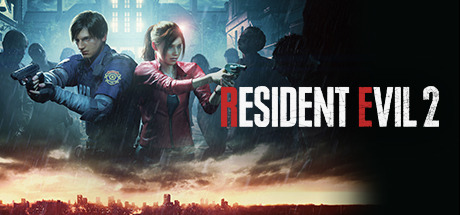
10. Ren Amamiya (Persona 5)

The general rule of life that I’ve learned is, no one is as cool as this guy is when they’re like 17. Joker, or Ren Amamiya as he’s known in the P5 anime, gets himself arrested and put on probation for basically nothing at the beginning of the game and spends the rest of it slowly building a lovable group of friends, dating someone way out of his league (or, you know, age range if you went with the teacher) and becoming the leader of an internationally recognised group of thieves who change the hearts of the wicked. Ren pretty much has his shit together from day 1, and I think we were all a bit jealous. Plus, look how cool he looks in that persona costume.
9. Asher Forrester (Game of Thrones)
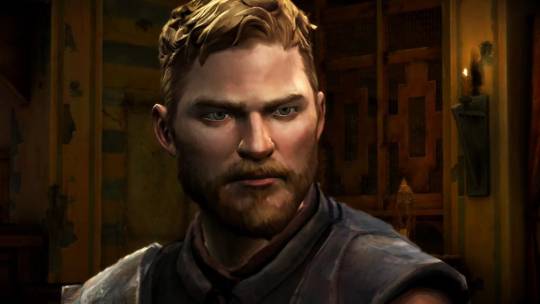
This may seem like an extremely odd choice, but those who’ve played the Telltale Game of Thrones will know exactly what I’m talking about. In a game that revolves entirely around the disgraced Forrester family, Asher is arguably the most disgraced of the lot. Asher is exiled from his hometown of Ironrath after his dad catches him trying to have a cheeky affair with Gwyn Whitehill, the daughter of a rival house, and instead now spends his days wandering about Westeros being a mercenary with his equally awesome also mercenary friend Beskha at his side. During his stint in Game of Thrones, Asher kicks the arses of a group of bandits, negotiates with Daenerys and rides back to his besieged hometown with a bloodthirsty band of freed slaves in tow. He’s funny, he’s a bit reckless, but he definitely stands out as the coolest member of the Forrester family.
8. Kratos (God of War series)

Kratos is pretty much iconic at this point. He’s stoic, strong, has a much more in depth character since the reboot came out and then managed to run away with Game of the Year against the likes of Red Dead 2. Kratos, the bald angry axe guy turned quiet, collected father figure (but he still has an axe), Kratos doesn’t tend to be too subtle about how cool he is, but that’s because he doesn’t need to be.
7. Emily Kaldwin (Dishonored series)

I debated giving this spot to Corvo, but I think Emily just about beats him out mostly because of the huge development you see in her throughout the games. After witnessing her mother’s death and being kidnapped by aristocrats for their own personal gain in the first game, she’s rescued by Corvo (oh, and then she’s kidnapped again. And rescued again) and eventually becomes empress. Then she gets dethroned anyway, and immediately jumps into kicking the behinds of everyone involved with the coup in excellent fashion, with the aid of her flashy new Outsider powers. So yeah, Corvo is undeniably brilliant, but I thought Emily wielded that folding sword just a little better.
6. Leon Kennedy / Claire Redfield (Resident Evil 2)
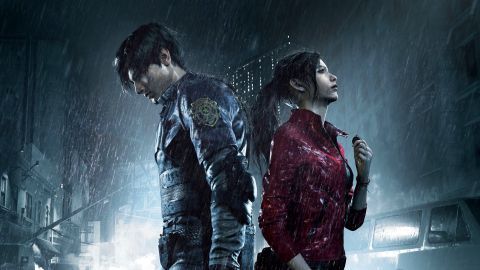
And here they are, the first day cop and the college student who really aren’t having a good day, but still tackle the apocalypse head on with the aid of lots of guns and a motorbike. I couldn’t decide which of these guys to give the spot tom, so they get to share. Considering the sheer amount of zombies, horrible mutants and crazed scientists they have to sift through during their unwanted journey, I’d say it would be a little insulting to leave them out after everything they go through. Plus, I think it’s pretty much bi culture at this point to want both of them to step on you, so Leon and Claire were mandatory picks.
5. Lara Croft (Tomb Raider series)

The mother of all adventure game protagonists has come a long way since polygonal temples and triangular boobs, and nowhere is this more clear than in the reboot trilogy, which has given as a brilliantly gritty rendition of Lara Croft that makes her much more badass than she ever was beforehand. Now that her character has been much more fleshed out, the iconic status really feels like it has some important character depth to back it up, and no list like this would be the same without her.
4. Joel / Ellie (The Last of Us)
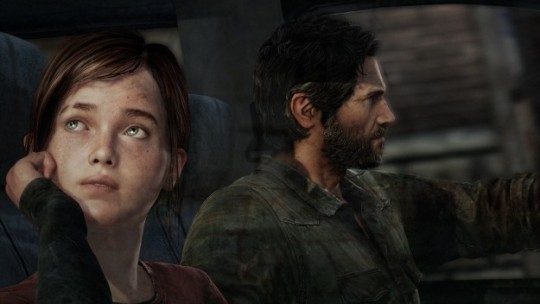
Oh, look I’ve broken the rules again! But I really couldn’t pick one or the other, so both of the trauma bonded duo that made us all cry back in 2013 get a spot on my list. They both went through pure, bleak hell and maintained most of themselves throughout it all. Joel, who lost his daughter within the first hour of the spore outbreak, has been living in Understandable Man Pain mode ever since, but then Ellie comes along, and the two basically becoming an unstoppable, bandit killing team. And nowhere does both of their pure cool factor come out better than during the stint of the game’s only proper antagonist, David, where both Joel and Ellie get some shining character moments that make you truly see how awesome they are for making it through. Looking forward to seeing them both again in the sequel!
3. Samus Aran (Metroid series)

More than anything, I feel just a bit sorry for Samus. I can’t imagine fighting the same purple dragon pirate who killed your parents for over 30 years is doing much good for her mental health at this point. But it’s fairly clear that she can handle it. Samus has been shooting the hell out of anything that opposes her since 1984, whether that be a huge brain in a tank or literally the Wii Fit Trainer, she’ll gun it down without a thought. And as one of the very first female protagonists in gaming, along with having a sick ass power suit, she has to be here.
2. Bayonetta (Bayonetta series)
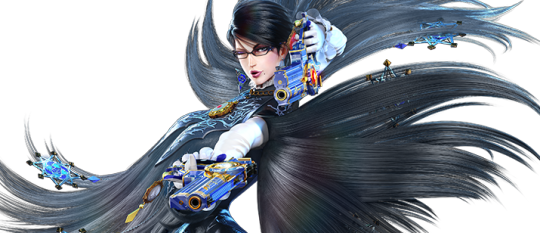
She can summon demon limbs basically at will. She has guns on her feet. She can slow time and kick your arse, and then speed it up again and continue to kick your arse. She’s one of the last surviving umbra witches and still somehow pulls off librarian glasses with the witch motif. When Bayonetta graced our screens, I think Morrigan from Dragon Age knew when to relinquish her Best Witch crown.
Before I unveil my pick for objectively the coolest game protagonist since Pac Man, here’s a few that didn’t quite make the cut:
Cloud Strife (Final Fantasy VII)
Solid Snake (Metal Gear Solid series)
Booker DeWitt (Bioshock Infinite)
Aloy (Horizon Zero Dawn)
Link (The Legend of Zelda series)
Clementine (Telltale’s The Walking Dead series)
Sam (Until Dawn)
Commander Shepard (Mass Effect series)
Arthur Morgan (Red Dead Redemption II)
1. Geralt of Rivia (The Witcher series)
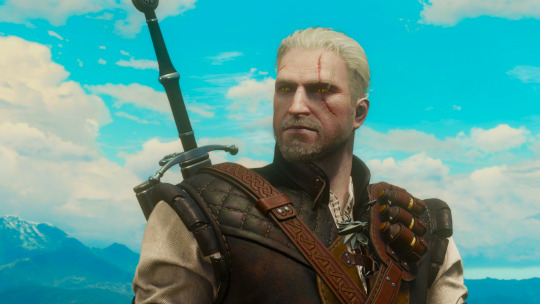
My number one pick is the only game character I’ve seen who pulls off the ‘gruff, stoic dude’ so extremely well that he doesn’t lose any of his complex, interesting character in the process. Geralt earns most of his kickarse points from being a no-nonsense monster hunter, who always keeps his head and know he has the upper hand in pretty much every encounter without flaunting it. But on top of that, he’s light, funny, sarcastic and has a great level of emotional depth. Oh, and he’s pretty much immortal. This guy defines cool.
So there’s my picks! Drop in at some point in the near future for a countdown of my personal top 10 LAMEST game protagonists, so we can see the flipside and take a look at the considerably less badass side of playable characters. See you then!
#persona 5#gaming#persona#game of thrones#god of war#resident evil#dishonored#the last of us#tomb raider#metroid#bayonetta#the witcher#metal gear solid#Final Fantasy#bioshock#horizon zero dawn#loz#Telltale The Walking Dead#until dawn#mass effect#red dead
82 notes
·
View notes
Link
American presidents lie. They always have. Just Google “Lyndon Johnson and the Gulf of Tonkin,” “Bill Clinton and NAFTA” or “George Bush and weapons of mass destruction.” Even Honest Abe likely told a fib or two.
But no U.S. president has ever lied as prolifically, constantly, insidiously and dangerously as Donald Trump. He never stops. He’s the Energizer Bunny of endless falsehood.
It’s enough to make even Orwell’s head explode.
Trump, who received votes from just one in four U.S. adults in 2016, claimed that he would have won the popular vote over Hillary Clinton were it not for the voter fraud of undocumented immigrants. The alleged criminal votes were never cast.
Trump called his 2016 Electoral College victory “The biggest electoral victory since Ronald Reagan.” It was no such thing.
Trump lied about the size of his inauguration crowd even as aerial photographs of the event contradicted his boasts.
He has repeatedly and preposterously claimed that the Latinx immigrant population is full of murderers, rapists and gang members. It is not.
Trump claimed that President Obama “had my ‘wires tapped’ in Trump Tower” just before his 2016 election victory. They were not.
He claimed to have as president-elect negotiated a deal to “save 1,100 jobs” at a Carrier plant in Anderson, Ind. He did no such thing.
He absurdly concocted a terrorist attack that never occurred, in Sweden, during his first month in office.
He claimed that the head of the Boy Scouts called him to say his speech was the best ever delivered to the Boy Scouts Jamboree. No such call ever took place. Trump’s terrible oration was widely reviled.
Trump claimed to have fired James Comey because the FBI director mishandled Hillary Clinton’s email scandal prior to the 2016 election, not because he was continuing to investigate Trump and the Trump campaign’s ties to Russia. That was another baldfaced lie.
He claimed that white-nationalist and neo-Nazi marchers in Charlottesville, Va., were “protesting very quietly,” and that liberal and left counter-protesters “didn’t have a [protest] permit.” False and false.
Trump laughably told oil workers in North Dakota that environmentalists “didn’t know why” they opposed the ecocidal, petro-capitalist Dakota Access and Keystone-XL pipelines. Ridiculous.
Trump lied repeatedly and viciously about the number of people who diedduring and after Hurricane Maria in Puerto Rico.
He ludicrously claimed to have led a strong federal response to the devastating storm in Puerto Rico. (He gave himself a “ten.”)
Trump absurdly claimed that his former national security adviser Michael Flynn didn’t do “anything wrong.” Flynn was later convicted for lying about his communications with the Kremlin during Trump’s presidential transition.
Trump farcically claimed that Paul Manafort never played a major role in his 2016 campaign. (Manafort chaired the Trump campaign up through the Republican National Convention that year.)
Trump falsely claimed that a Justice Department inspector general report exonerated him of collusion with Russia and obstruction of justice. The report did neither of those things.
Trump ridiculously claimed that Michael Cohen was never a big player in his career or campaign. Cohen was Trump’s longstanding personal attorney and “fixer,” and he too has been convicted on federal charges.
Trump has claimed to know nothing about the illegal campaign finance payoff of Stormy Daniels and Karen McDougal. Cohen exposed that lie this summer.
After Cohen turned himself in to federal authorities, Trump said that Cohen pleaded guilty to two counts of campaign finance violations that “were not crimes.” False. The violations are indeed federal crimes.
Trump unbelievably claimed not to have known that his son and son-in-law met with Russians claiming to have dirt on Hillary Clinton in Trump Tower in June 2016.
Trump helped concoct the White House lie that the real subject matter of that June 2016 meeting was U.S. adoption policy.
He says that China “has been attempting to interfere in the upcoming 2018 elections.” There is no evidence to support that charge.
He falsely claims to be a self-made billionaire, something that The New York Times shows to have been a lie. (His father staked his entire business.)
Trump says that he and the Republican Party passed a “middle-class” tax “reform.” He certainly knows that they enacted a plutocratic tax cut, a great windfall for big corporations and the richest 1 percent.
Trump absurdly claimed before the tax cut that “we [U.S.-Americans] pay more taxes than anybody in the world” (we don’t) and that the tax “reform” would “cost me a fortune.”
He absurdly said that “public lands will once again be available for public use” while handing over 2 million acres to private corporations for coal mining, oil drilling, uranium extraction and other environmentally disastrous industrial activities.
He falsely claimed that he was legally compelled to order a “zero tolerance” border policy last spring that separated Mexican and Central American children from their parents.
In defense of his good friends atop the absolutist, head-chopping Saudi Arabian regime (which sends kill teams to torture, kill, and vivisect dissenting journalists in foreign embassies), Trump claims that Saudis have purchased $110 billion worth of military equipment from the U.S. and that this purchase creates “five-hundred thousand jobs,” later inflated to ““1 million jobs.” ”in the U.S. His numbers here are absurdly exaggerated.
He claims without evidence that there are “people of Middle Eastern descent” in the latest Central American migrant “caravan” moving through Mexico towards the U.S.’ southern border.
He baselessly insisted that “Democrats are paying members of the caravan to try and get into the U.S. to harm Republicans in the midterms.”
He has sent U.S. troops to guard the border on the absurd lie that the beleaguered caravan constitutes a “national emergency.”
He preposterously claims that it is the mainstream media, which he calls “the enemy of the people,” and not him that has created our current climate of hatred and violence—even as he applauds a Montana congressman for body-slamming a young reporter.
Trump’s evasion of responsibility follows a hate-filled campaign and 21 months of ax-grinding in the Oval Office that has seen him call immigrants criminal gang members, murderers and rapists, while maliciously describing his political enemies and media critics and journalists as “evil,” “low lifes,” “low IQ” and “the most dishonest people on Earth.” Along the way, the openly sexist Trump has referred to women as “animals,” “dogs,” “horse-face,” “fat” and worse. The white supremacist who killed 11 people in a Jewish synagogue last Saturday was egged into violent action by Trump’s ridiculous and hateful caravan rhetoric.
The Trump Lie Machine is going into head-spinning and soul-numbing overdrive as the midterm elections draw closer.
Trump claimed earlier this year that leftist violence will break out across the country if Democrats reclaim Congress in the upcoming midterm elections. The absurdity speaks for itself.
Trump said in Arizona recently that immigrants had illegally taken over a city council in California. The claim was complete nonsense.
Trump has recently and insanely suggested that people are “rioting” in California “to get out of Sanctuary Cities. …They’re demanding to be released from sanctuary cities.” (This may be the single craziest thing I’ve ever seen Trump claim. It is truly bizarre.)
Trump is ridiculously claiming the Democrats will kick seniors off health insurance, abolish insurance protections for people with health problems, destroy Social Security, abolish U.S. borders and (I am not making this up) give “illegal” immigrants “free cars.” That’s right: “free cars” for “illegals.”
Trump repeatedly—36 times across seven political speeches this fall—called the Democrats “radicals.” Of course, the Democrats are a deeply conservative, Big Business-friendly, imperial/pro-military, and depressingly centrist apparatus. There isn’t a single genuine radical in their entire party.
Trump says that the “new platform of the supposedly ‘radical’ Democrats is to abolish ICE” (Immigrations and Customs Enforcement). That is flatly false.
Trump lies and distorts so relentlessly and profusely that tracking and fact-checking his false statements has become a full-time job for journalists at home and abroad.
One of these journalists is Daniel Dale, the Washington bureau chief of the Toronto Star. He calculates that Lyin’ Don has made four false claims per day since being sworn into the presidency 21 months ago with his hand on the Bible.
When Dale was first assigned the Trump beat in September 2016, he found the Republican candidate “so incessantly dishonest” that his habit of twisting and inverting reality required a specific focus “separate from the day-to-day news coverage I was doing.” Dale looked forward to being “freed from this [ugly] task” of covering Trump’s persistent untruths once Hillary Clinton prevailed, as was widely expected. Trump won “and so, [he] had to continue.”
What accounts for this endless mendacity and rhetorical manipulation? Speaking to “Public” Broadcasting System “NewsHour” anchor and Council on Foreign Relations (CFR) member Judy Woodruff last week, Dale theorized that Trump and the Republican allies and outlets who repeat his outlandish and bogus assertions want to drive media coverage and political discourse away from topics they wish to avoid—health care, the Mueller investigation and “anything else the president doesn’t want us to talk about,” such as Trump’s still unreleased tax returns, climate change and the party’s regressive tax cuts.
Dale is on to something there, no doubt, but the real meaning of the president’s Twitter-amplified Fibby Pulpit is deeper and darker than mere diversion and partisan spin. As Chris Hedges suggests in his latest book, “America: The Farewell Tour,” Trump and his party’s continuing defiance of reality suggests that the United States is sliding into “corporate totalitarianism”:
Trump and the Republican Party represent the last stage in the emergence of corporate totalitarianism. Pillage and oppression are intensified by the permanent lie. The permanent lie is different from the falsehoods and half-truths uttered by politicians like Bill Clinton, George W. Bush, and Barack Obama. The common political lie these politicians employed was not designed to cancel out reality. It was a form of manipulation. … But Clinton did not pretend that NAFTA was beneficial to the working class when reality proved otherwise. Bush did not pretend that Iraq had weapons of mass destruction once none were found.
The permanent lie is not circumscribed by reality. It is perpetuated even in the face of overwhelming evidence that discredits it. It is irrational. Those who speak in the language of truth and fact are attacked as liars, traitors and purveyors of ‘fake news.’ They are banished from the public sphere once totalitarian elites accrue sufficient power, a power now granted them with the revoking of net neutrality. … “The result of a consistent and total substitution of lies for factual truth is not that the lie will now be accepted as truth and truth be defamed as a lie, but that the sense by which we take our bearings in the real world – and the category of truth versus falsehood is among the mental means to this end – is being destroyed,” Hanna Arendt wrote in The Origins of Totalitarianism. …
The permanent lie turns political discourse into absurdist theater. … Treasury Secretary Steven Mnuchin claims he has a report that proves the tax cuts will pay for themselves and will not increase the deficit – only there never was a report. … The permanent lie is the apotheosis of totalitarianism. It no longer matters what is true. … When reality is replaced by the whims of opinion and expediency, what is true one day becomes false the next. Consistency is discarded. Complexity, nuance, and depth and profundity are replaced with the simpleton’s faith in threats and force.
Consistency is discarded. The Trump administration has cited “states’ rights” in trying to roll back federal requirements that out-of-date coal and nuclear plants be shut down, even as it endeavors to federally negate the state of California’s right to enforce comparatively stringent emission regulations.
Republican Congressional candidates run campaign commercials proclaiming their commitment to retaining the Affordable Care Act’s provision prohibiting health insurance companies from discriminating against people with pre-existing conditions at the same time that the GOP is viciously challengingthat provision in court.
Trump blames the nation’s bourgeois media and a timid, centrist Democratic Party for the hatred, incivility and demonization that pollute U.S. politics while he calls his opponents “evil” and celebrates violence against liberals and journalists.
It is important to understand, as Hedges does, that the Trump-led assault on veracity, evidence and our very ability to separate truth from falsehood has been able to gain traction only because a decades-long corporate coup has devastated and discredited public education, academia, organized labor and the legal and criminal justice systems. It has done all this and more while turning the Democratic Party into what the late Princeton political scientist Sheldon Wolin called the nation’s Inauthentic Opposition.
Think of this distinctively American “corporate-managed democracy” and “inverted totalitarianism” as the nation’s pre-existing authoritarian condition for the rise of an Amerikaner-style fascism.
In the face of what an authoritarian like Trump and his white-nationalist Republican Party have done over the last two years of one-party rule—an annulment of what’s left of the U.S. Constitution’s much-ballyhooed “checks and balances”—there’s no credible moral argument against the notion that progressives living in contested districts should choose the lesser of two evils in next week’s midterm elections. Adolph Reed Jr., Noam Chomsky and Arun Gupta’s warnings about the dangers of a Trump presidency have been richly born out. I, for one, should have paid them more heed.
Still, we on the left, what’s left of it, should nonetheless retain our capacity to be properly nauseated by a yard sign I recently saw in arch-liberal, super-blue Iowa City, Iowa. Surrounded by other, smaller signs with the names of a handful of dismal local and statewide Democratic candidates, it read “MAKE AMERICA GOOD AGAIN: Vote.”
Please. The notion that the richly bipartisan corporate totalitarianism of which Trump is the apotheosis can be reversed, and the nation made “good” simply by voting Herr Donald and the Republicans out of office is a childish fantasy.
That, too, is a Great Lie. As marchers celebrating a rare legal victory over a white supremacist U.S. police state in Democratically controlled Chicago chanted last month, “The whole damn system is guilty as Hell.” It’s the whole damn system that must be democratized from the bottom up. From the dismal dollar Democrats, The New York Times, The Washington Post, CNN, MSNBC, “P”BS, Tom Steyer, the Gates Foundation, the Brookings Institution, the CFR, the Atlantic Council, the Obama and Clintons on the so-called left, to the radically reactionary Republicans, the Koch brothers, the Mercers, the Heritage Foundation, the American Enterprise Institute, Fox News, the Weekly Standard, the Hudson Institute, the Hoover Institution, and the American Legislative Exchange Council, Breitbart, right-wing talk radio, the Sinclair Broadcasting Co., the Federalist Society and more on the actual right, imperialism, racial inequality and class rule have brought us to this menacing pre-fascist moment.
Paul Street
ContributorPaul Street holds a doctorate in U.S. history from Binghamton University. He is former vice president for research and planning of the Chicago Urban League. Street is also the author of numerous books,…
Phroyd
99 notes
·
View notes
Text
Alex Paints Things Ch.2 Pt. 2: Holding Pattern
What else can I do other than the primary colour of this guy? Well as the rap group Atmosphere told me, when life gives you lemons you paint that shit gold.(Again a disclaimer for camera nonsense.)
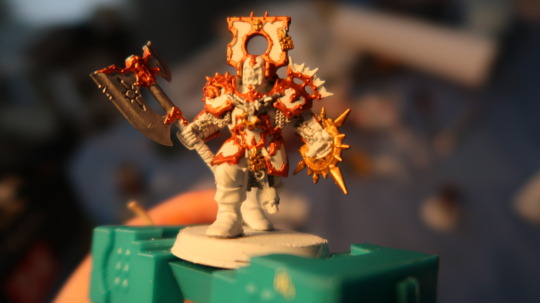
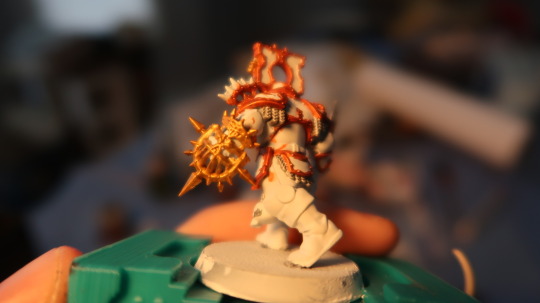
And by that I mean retributor armor. Having the emblems on his head and between his legs as gold was an easy choice. I think almost all of these guys will have that. The the hi-five-star took a bit of thinking though. I deferred to the box art which depicted most of these style of weapons with a gold base to them so rather than agonize over it I just followed suit.
Going to make a bit of a leap here because honestly I just forgot to take pictures.
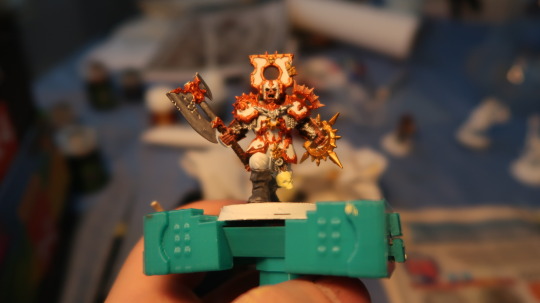
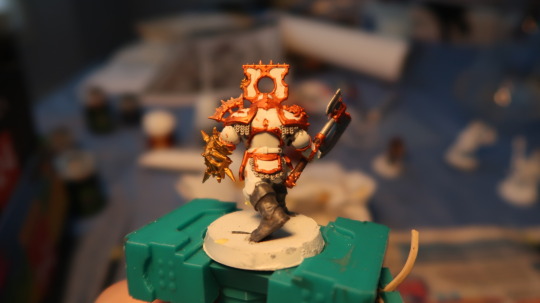
I gave the grip of his weapon as well as his gloves some love by way of Catachan flesh, what I used for the skin tone for angry man number one. It’s a rich brown that I feel like has a lot of versatility. For the boots, mix most parts mars black from the Arteza paint set I have and a tiny bit of neutral gray which I picked up at a crafts store. Now the weird thing I did here was his face. I misunderstood where the helmet ends and the face begins and now he’s got a weird pig face but I thought it was a good look for him so it stuck. The skin is done with bugman’s glow. The skull dangling between his legs? Lets not talk about that. I tried a bit of yellow and some white and what I got was a creepy looking lemon.
Oh no I got to the point where I can’t procrastinate anymore. I wasn’t sure this would work well but I was out of other options so I decided the first ranger would be Zack, the black ranger.
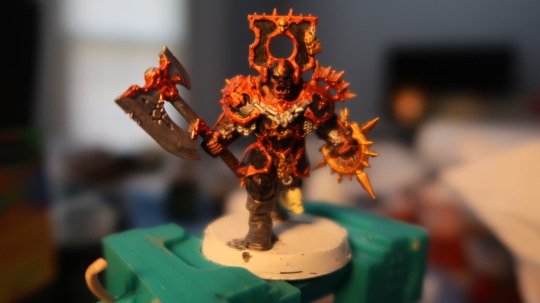
Pretty happy with that decision. Given the rest of the options I think this worked best with the copper, allowing both to show and be distinct without overpowering one another. What happened with his face was not optimal but I’ve gone too far now. Time for some finishing touches.
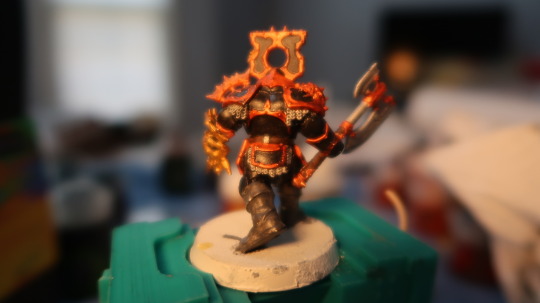

I hit up almost the entire mini with nuln oil for shading. I made sure I jammed it on the engraving on the weapon to make it pop. Big fan of what it did with the gold. I swear that gold looks good on anything. I used agrax again on the skull however and it turned my Halloween citrus in to a proper ornament.
What you might have noticed on his left shoulder flair is some white. That was an attempt at highlighting. I wanted to make that looked like stretched skin on bones so it shares the same shade as his own skin. I attempted to lighten up the same shade with some white to throw over the pointy bits so they popped out. It was a bit of a mess and I simply wiped it clean and that was what was left. Something similar happened with the edges of the axe. I still have zero Idea what I’m doing with highlighting and I plan on coming back to Zack here and the first guy after doing some research.
What did we learn this time?
-Maybe planning colours is a good idea.
-Nooks and crannies suck. Having a thin brush with long bristles and using the side helped a lot but in some cases was messy.
-Control. This guy took me roughly eight hours over two days to do but I noticed I was able to move things along quicker as I went. Maybe it’s a confidence thing? Maybe my hands went from a Richter Scale 6 quake to a 4. I think both.
What do I think I improved on?
-Again control. I think I did half decent in getting paint where it’s supposed to be and that has been a major concern from day one.
-Brush choice. I tried to brute force a lot of things on the mini before this one with a larger brush and hoping to bring the tip fine enough to solve my problems. This time I was swapping sizes and types of brushes often.
-Application. Some parts were rough but each coat felt a lot more reasonable this time around. Better focus on how much paint was on the brush. Better understanding of how much brush to put on the surface.
Next up? Same as this one more or less. I want to finish my power ranger squad. I may take some time and put the box set together so I can choose from there as opposed to looking at sprues. The two guys I showed in part one of this chapter are the next up on the to do list.
Constructive Criticism, comments and related tidbits are encouraged.
#hobby#hobby painting#Warhammer#age of sigmar#games workshop#Citadel Paints#painting#mini painting#miniature painting#art#me#apt
1 note
·
View note
Note
What's your opinion of marco/tobias? My friend basically had me thinking about how it could have possibly worked if the (slightly unhealthy I may add) rachel/tobias relationship hadn't spawned.
I love to speculate about Marco/Tobias — they’re probably my rarepair OTP. Their interaction in the back half of the series is AMAZING because it absolutely shows how much they’ve grown as people over the course of the war and how codependent mutually supportive that team has become.
That said, I don’t think that Tobias or Marco would be healthier if they were a couple. Rachel might be a deeply flawed human being, but she’s also infinitely better than Marco at recognizing and handling her own and others’ emotional crap. She’s not only good at discerning things like her dad’s fear of loneliness after moving (#7) and Melissa’s insecurities about letting friends visit her house (#2) but also has a wonderfully no-nonsense response style. When the going gets tough, Rachel gets going. When she can tell that Cassie and Jake’s crush is mutual and is also going to die on the vine without intervention, she goes so far as to ask Cassie out on Jake’s behalf and then accept Jake’s invitation on Cassie’s behalf (#29). When she knows that Marco needs reassurance that he did the right thing by letting Visser One go, she “hears” an escape submarine — and then yells at Marco for being such a doofus he missed hearing it too (#15). She’s brutally honest about the fact that Cassie shoves off responsibility onto others and then judges them for taking that responsibility (#48) and in pointing out that Marco needs closure almost more than he needs his mom back (#30). This is a girl who beats her enemies to death with her own severed arm (#33), shamelessly cries during weddings (#35), goes into squealing enthusiast mode over mall sales (#16), commits murder to protect her friends (#48, #54) and utterly refuses to apologize for any of it.
To be clear, that directness is not always a strength — she verges on meanness when calling Ax out for latching onto the first andalite authority figure who comes along in #18, and her take-no-crap style of discourse hurts her mom in #50 almost as much as it helps Jake in #53 — but it’s also a lot of what Tobias needs. Rachel shows up uninvited with a McDonald’s bag when she realizes that Tobias’s meadow is running out of food, and announces that he can eat first and worry about her babying him later (#49). She shrugs off the revelation that he eats roadkill (#13) and remembers his birthday even when he has himself forgotten it (#23). Frankly, Tobias needs that level of bluntness in his life. He’s the kind of person who overthinks everything, even to the point of almost getting himself killed because he’s too busy debating the symbolism of eating a snake after a snake almost ate him to see a guy standing ten feet away with a bow and arrow (#49) and who goes to ridiculous lengths to avoid depending on others for help to protect his own pride (#3, #54). Not only does Tobias provide Rachel with a much-needed dose of acceptance and support (X, X) but Rachel effectively cuts through Tobias’s crap enough to tell him outright that she can tell he’s struggling and that she’s going to help him whether he likes it or not.
By contrast, Marco frequently goes too far when teasing Tobias in the early books (#3 and Marco all-but saying outright he’d rather die than end up like Tobias, #10 and the joke about roadkill as movie snacks, #12 and some of the problematic comments about Rachel and Tobias’s relationship) and then tries to tell himself that Tobias will brush it off. Marco also tends to perceive Tobias as having it “easy” for having a sexy girlfriend and not going to school (or at the very least he claims he sees Tobias as having it easy) meaning that he’s not great at supporting Tobias during some of the tough emotional moments Tobias deals with during #33 and #43 especially. Yes, there’s that awesome moment in #49 with Marco pulling Tobias aside after the discussion about whether or not to save Loren and basically saying “I’ve been in your shoes, and no matter what you decide — to save her or to let her be a controller — I’m going to support you 100% because I know there are no good choices here.” There’s also the even awesomer moment in #3 when Marco throws the baseball through the roof of the mall to save Tobias’s life. However, those seem to be the exception rather than the rule. It’s notable that in #54 Marco fails pretty miserably at providing any kind of emotional support to either Jake or Tobias, and that in #35 he responds to Cassie worrying about Tobias with an effective “meh, whatever, we all have problems.”
To be clear, Marco has definitely moved Tobias from the category of “person who I would casually murder to achieve my own ends” to “person for whom I would happily set myself on fire” (which, let’s be honest, are the only two types of people in Marco’s book) by the time the series is in its mid-30s. There’s no single turning point that you can easily pull out, because K.A. Applegate does slow-and-steady character development LIKE A BOSS, but it’s fascinating to watch the shift. As late as #15 they’re willing to be unbelievably mean to each other when both trapped in a crappy situation — Tobias’s crack about Marco having a soft spot for Visser One is probably the most cringe-inducing, but Marco’s 40 different variations on “what’re you, scared?” as Tobias gets ready to go underwater for the first time are almost as bad. As early as #30 they’re an incredibly effective team whose surface-level snark barely conceals a deep and genuine mutual affection — they build off each other during that ridiculous conversation about hackysack, work together to keep Rachel from going off the rails after Jake and Cassie are “killed,” and trust each other well enough to cede control back and forth during their reconnaissance mission. By #33 Marco proves willing to let himself get stabbed to protect Tobias, and by #51 they’re actively seeking out each other’s company while also avoiding the Berensons. (The two of them sitting back and watching both Jake and Rachel self-implode while doing nothing to try and help is Exhibit A as to why they can’t emotionally support each other, by the by.)
Marco and Tobias like each other. They work well together. They’re hilarious and adorable. They’d make a freaking awesome couple. I could read about them interacting all day long. I want them to steal a tank and drive off into the sunset and live happily ever after in a land of infinite rabbits and zero poodles.
I just also think that Tobias definitely, Marco maybe, would be less healthy than they are in canon, assuming they were a couple.
#actual fandom bicycle tobias fangor#animorphs#marco animorphs#rachel berenson#otp alert#asks#answers#tobias fangor#anonymous#animorphs meta#emohawk#the one and only
115 notes
·
View notes
Text
Gore’s Games of 2018

I’m sure you all know the drill at this point. Everyone and their mother seems to post a list about all of their favorites from the year, so I’ll spare you the build up and just get into some of the games I enjoyed in 2018.

Games Crossed Off the Backlog
This year I’m going to kick things off with some of the great games I finally got around to playing from my backlog. A good amount of these games are ones that I mentioned last year as ones I wasn’t able get to. All of these games were great and a couple would have easily made my Game of the Year list under normal circumstances.
Horizon Zero Dawn | Injustice 2 | Kirby: Planet Robobot | Slay the Spire | Super Mario Odyssey | Titanfall 2 | Uncharted: The Lost Legacy | Wolfenstein: The New Order
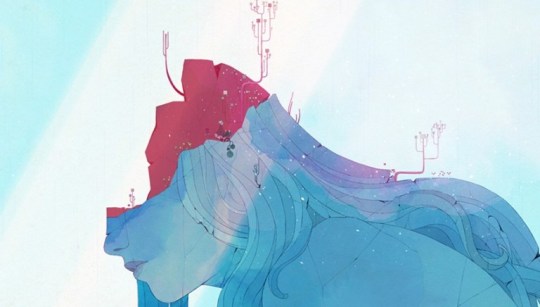
2018 Games I Missed Out On
Next up, I’m going to highlight the games from 2018 that ended up on my backlog or that I still haven’t purchased yet. These are all games that I’d love to play at some point, and this is the reason why you won’t see them on my main list.
Below | Call of Cthulhu | Captain Toad: Treasure Tracker | Detective Pikachu | FAR: Lone Sails | Gris | Katamari Damacy Reroll | Mega Man 11 | Moonlighter Spider-Man |Spyro: Reignited Trilogy | Tetris Effect | We Happy Few
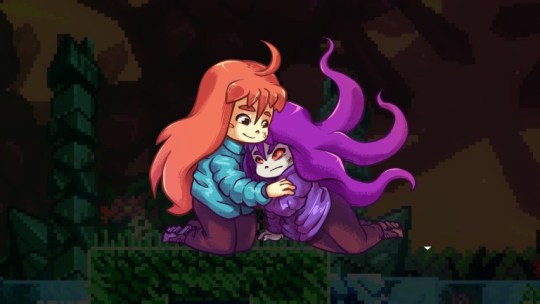
Honorable Mentions
This final section (before I get to my actual picks) highlights some of the games I played and enjoyed but not enough to feel comfortable writing about them or including them on my GOTY list. I look forward to digging into all of these more in the coming months.
Celeste | Dead Cells | Into the Breach | Super Smash Bros. Ultimate | Yoku’s Island Express
Top 5 Games of 2018

NBA 2K Playgrounds 2
I’m going to kick this off with a game that I can’t imagine will be anywhere near most people’s game of the year lists. NBA 2K Playgrounds 2 continues to be a divisive game due to its microtransactions and player unlock system, but at its core, it really is a fun arcade-style basketball game.
The gameplay harkens back to the NBA JAM games and it’s over the top and kind of absurd at times. With every game played, you’ll be leveling up players and earning currency that will allow you to unlock new players. So while the game does offer microtransactions, they aren’t necessary if you’re okay with a bit of a grind. It’s not exactly ideal, but that kind of gameplay is right up my alley. I feel like I’m making progress each time I play and it ensures I will keep coming back for more. If you’re an NBA fan and know what you’re getting into, there is a lot of fun to be had here.
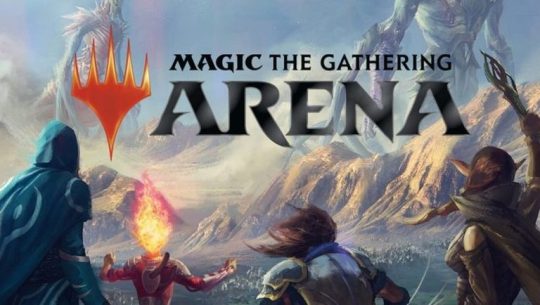
Magic: The Gathering Arena
Arena was actually first available to play in 2017, but only entered into its open beta phase in 2018, so for that reason, it makes my list. Hell, when it officially releases it will probably make a future GOTY list again.
I was very skeptical about Arena because it looked like Wizards of the Coast was just trying to ripoff Hearthstone‘s aesthetic (and they kind of are), but this is actually a good game and once I played my first match I was hooked. It’s a great place for both newcomers and veterans of Magic to play. Arena is much more user-friendly and intuitive than Magic Online while also offering a far more authentic Magic experience than previous Duels games have.
The game is free-to-play, and I know that term gets a bad wrap nowadays, but Arena does it right. You can buy booster packs with real money or you can earn gold (and even single cards or packs on occasion) naturally through playing. I was able to build one of the most competitive decks in the format in a few weeks time and that was just by playing a few matches each day. Even in the early stages you’ll quickly earn a number of “starter decks” which will supply you with a decent selection of cards. So you’ll never be short on new things to try while you work towards building your card collection.
Arena is fantastic, and if you’ve ever even been curious about Magic: the Gathering, you should give it a shot.

Pokémon: Let’s Go, Eevee!
Over that past few years I’ve played a lot of Pokémon. Between revisiting Blue, Silver, SoulSilver, Pearl, White, White 2, X, Y, Alpha Sapphire, Omega Ruby and playing through the new releases of Sun, Moon, and Ultra Moon, as well as shiny hunting in a few of those games, I’ve spent nearly 1,000 hours with the series in the last three years. Needless to say, I was starting to feel a bit of Pokémon fatigue (which is why I still haven’t played Ultra Sun). If that wasn’t enough, I was also never a big fan of Pokémon Go!. So when the Pokémon: Let’s Go! games were announced I had zero interest and pushed them completely off of my radar. Then the games finally released and my love for Pokémon got the best of me. I started reading reviews, watching videos, and talking to friends about them. Eventually I looked past my skepticism and decided to give it a try and I’m so glad I did.
Pokémon Let’s Go! was a breath of fresh air for me. It was a laid back experience that I didn’t even know I needed. It’s far more streamlined than other games in the series as you can choose when to encounter wild Pokémon and you no longer need to battle in order to catch them (in most cases). This aspect was one of the biggest reasons I was skeptical of the game. While catching Pokémon is probably my favorite part, I do enjoy the battles as well. I was afraid I wouldn’t get the battle itch scratched, but that wasn’t the case at all. There are more than enough trainers to battle throughout, so it was almost the perfect blend of catching and battling for me.
I went with the Eevee version and oh boy, Eevee is a little badass. That little dude is completely overpowered in Let’s Go! and makes it a breeze if you choose to play that way. It’s definitely the easiest Pokémon game I’ve ever played, which is saying a lot because they’ve never been known for their difficulty, but that didn’t stop it from being the most enjoyable time I had playing a game in 2018.

Octopath Traveler
Another game that surprised me in 2018 was Octopath Traveler. I’ve never been the biggest fan of JRPGs, but I was immediately drawn in by Octopath Traveler‘s charming art. When I finally got my Nintendo Switch last year it was the first game I really dug into. As it turns out, by the end of my 80 hours with it, the characters and combat system became something I loved even more than the art style that initially caught my attention.
Octopath Traveler‘s combat is turned-based and revolves around a “break” system. Each enemy has certain weaknesses to specific weapon types or elemental attacks. If you hit them with one of those attacks enough times their defenses will break and they will be stunned the following turn, allowing you to deal increased damage. There is also a boost system that allows you to hit with multiple attacks each turn. Without delving too deep into the mechanics, I’ll just say all of this offers a ton of strategic options and makes combat a joy.
If the title wasn’t telling enough, Octopath Traveler‘s story focuses on eight different characters. Each character has their own set of chapters you can complete, a variety of traits and combat options, and a unique personality and story to tell. You don’t have to finish every character’s storyline, but I exhausted all story options because I found myself wanting to know more about each one of them. I’d even go so far as to say that there hasn’t been a collective group of characters I liked this much since the original Mass Effect trilogy.
I feel like Octopath Traveler got overlooked by a lot of people, so if you’re a fan JRPGs or just looking for a quality experience you should seek this one out.
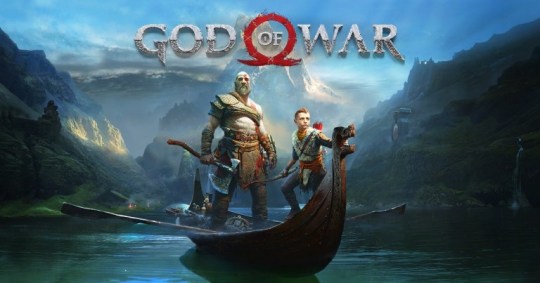
God of War
Continuing with the trend of games that surprised me last year, next up is God of War. I’ve dabbled a bit in the God of War franchise, but the 2018 release was the first game in the series I’ve ever seen through to completion. It is nothing like its predecessors as it trades in the linear gameplay and shallow, over-the-top brutality for an engaging and robust world, as well as a far more rewarding combat system.
Perhaps the biggest accomplishment of God of War is that it made Kratos into a character with depth and one that I was able to invest in. It also introduced his son, Atreus, and their relationship was something I loved watching evolve over the course of the game. Kratos is still a no nonsense badass, but his humanity is allowed to shine through in his interactions with Atreus.
As I mentioned, the combat in God of War is so much more rewarding than it was in previous entries. While you might still be able to mindlessly hack-and-slash your way through on easier difficulties, if you truly want to master combat you’ll need to develop more in-depth strategies. Kratos wields the Leviathan axe this time around, which you can use for melee attacks or as a projectile. The most ingenious part is that you can recall the axe with the press of a button which not only adds to your strategic options, but also creates a very satisfying ebb and flow to combat. You’ll also have to incorporate blocking and parrying, as well as guiding Atreus to use his bow. Once I was able to start stringing together all of these moves and tactics, God of War‘s combat system quickly became one of my all-time favorites.
God of War also offers up tons of side content to keep you busy for hours. With the recent release of a New Game+ mode, I’m looking forward to running through it again. It was quite the experience and one I’m happy to call my favorite of 2018.
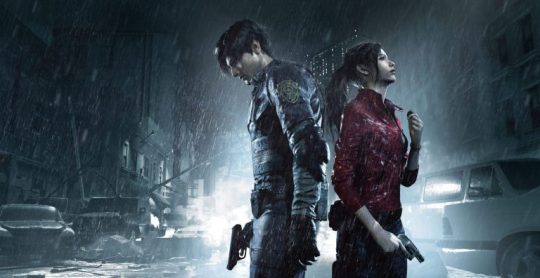
Most Anticipated Games
It’s always fun to look to the future, so I’m going to wrap things up with my most anticipated games. Some of these games have 2019 release dates and others I’m keeping my fingers crossed for.
Animal Crossing (Switch)| The Last of Us Part II | Mortal Kombat 11 | Pokémon (Switch) | Resident Evil 2 | Spelunky 2 | Super Meat Boy Forever
0 notes
Text
Bagginshield #13 - getting married
Rating: T
Summary: for the 30 Day OTP Challenge. Bilbo and Thorin get married! It’s awesome! And horrible! Wow! Alternate Universe - Fix It
Bilbo probably should have realized what their wedding would be like just by how Thorin had proposed to him.
“Thorin wants to know if you’ll marry him,” Kili had asked, sweating buckets for some reason (he’d run all the way from the training grounds and up to the library at record speed, Bilbo would later find out). “He might be dying so please say yes.”
“What?”
In an effort to teach Gimli how to properly swing his axe farther and faster (???), Fili had twirled around in circles as if he were doing a particularly inspired hammer throw, but before he could let go he’d of course managed to hit someone. Luckily the sharp end was pointed in the other direction so that only the back of it met Thorin’s head.
“Good thing it wasn’t double-edged, eh?” said Fili, nudging Bilbo and laughing nervously.
Bilbo, clutching Thorin’s hand and still deeply worried despite the ‘all clear’ from Oin, cast Fili such a scathing look that the dwarf stumbled over his own feet to escape the infirmary. Kili, upon seeing his brother flee, hastily followed on reflex.
“Don’t be angry with them, Bilbo,” Thorin said, squeezing his hand. “This is not the first time I’ve been hit in the head with a blunt instrument.”
Bilbo raised an eyebrow. “You don’t say?”
Dwalin came to visit Thorin eventually, seeming unconcerned and even a bit disdainful of Thorin’s injury. When they started comparing instances of head trauma and arguing about who had passed out the longest, Bilbo had rolled his eyes and retreated into the storeroom to make more of Thorin’s tincture. That’s when he overheard them.
“….reschedule, you’re in no shape for dancing. And we can send the pachyderms back, there’s a thirty day return policy….”
Bilbo did not like the sound of any of this.
“No! We’ve been planning it for months!” said Nori, and when did he get here? “I’m not stealing all that wine again.”
“Some thief you are.”
“Hey!”
“Quiet before he hears you,” Thorin interrupted them. “Tell the others that we will rendezvous at the secret room in three hours. And I suppose we must get rid of the pudding.”
“What? No!”
Having heard enough, Bilbo clinked a few vials together pointedly and turned to leave. When he reentered the room, Nori was nowhere in sight, Thorin had a stupid grin on his face, and Dwalin’s expression was deeply pained.
“What’s going on?” asked Bilbo, looking between the two of them suspiciously.
“Nothing at all,” Thorin replied, before raising his hand for Bilbo to take. “I think I might rest now, my hobbit.”
“I’ll stay with him,” grunted Dwalin. He would not meet Bilbo’s eyes.
He sighed. “Very well. I suppose I’ll come see you later.”
Bilbo grabbed a broom from the store room and trotted out and into the hallway. He zeroed in on the small wooden door above him, which covered the old laundry shoot for the infirmary. Bilbo whacked it twice with the broom handle.
“What,” said Nori, opening the little door and peering out. His eyes widened when he saw Bilbo.
“Get down from there!” Bilbo hissed. “Tell me what’s happening this instant.”
Nori ducked his head and peeked over the edge of the shoot. “I don’t know what you mean.”
“Don’t make me come up there!”
Nori’s eyes grew even wider. He said nothing for a moment, seeming to think over his options. “Alright,” he gave in, taking a fortifying breath. “Thorin wants to know if you’ll marry him.”
Bilbo only stared.
Nori grimaced. “And…he’s…very keen?”
Bilbo raised an eyebrow.
“Are you, uh, keen too?”
Bilbo said nothing.
“Ok bye.”
Nori retreated and swung the door closed. Bilbo could hear him shuffling through the vents hastily.
He was getting a massive headache, so he took out one of Thorin’s pain relievers and knocked it back. It tasted like frustration and defeat.
It only got worse, of course.
“What do you think about…weddings?” Gloin asked him tentatively, blocking the way to the kitchens.
“I think I’m hungry,” said Bilbo.
“Oh, we’ll have food, of course. A proper feast. Was that a yes?”
Balin had put an arm around Bilbo’s shoulders, his expression fatherly and affectionate. “Bilbo, I’ve been meaning to ask you about your future here with us….”
Bilbo raised his eyebrows. “Am I being promoted?”
“What? No.”
Eventually Bilbo realized that sarcasm simply did not work on dwarrow, and so he would have to be blunt with them. He got his chance when the last dwarf to confront him with this nonsense was Bofur, who was shockingly no better than the rest. In fact he was the worst, which wasn’t fair because Bilbo had trusted him more.
“….what with you two having already sealed the deal, as they say, or er, consummated your sacred vows of sorts. Loudly. Anyway, the next step is tying the knot, so to speak, settling down and all. The old ball and chain. Then maybe a few sprogs. Two or three? No one’s counting, though, Bilbo, there’s no pressure. But about saying yes to my proposal – ”
“To Thorin’s proposal, you mean?” he interrupted, rather sharply. His blood pressure had risen ever higher the longer Bofur had gone on. “Which he should be making? And not you?”
Bofur wisely backed away a bit. “….yes?”
“I don’t care if he’s hospitalized and you all feel wretched about it!” Bilbo exploded, stomping his foot for good measure. “This is Thorin’s moment! Or did he put you up to this? He should know that proposals can wait until he’s not got head trauma!”
“No, no!” he denied hastily, waving his hands. “Thorin has no idea we’ve spoken to you! We…well, we wanted to help.”
Bilbo crossed his arms, glaring. “Well, you haven’t! And he’s going to be heartbroken when he finds out you’ve all proposed to me for him. Honestly!”
“I….” Bofur looked down at the ground, a desolate expression on his face. “I hadn’t thought….”
“Which is why you’re going to go away and tell everyone to keep quiet about pestering me, and I will act surprised when he proposes in some grand and extremely humiliating manner, and you will all help him propose in that grand and humiliating manner, or I swear Bofur I will make all of your lives utterly miserable!”
Bofur gulped and nodded and turned to scurry away. Then he paused. “Was that…a yes?”
The murderous look Bilbo sent the dwarf’s way would haunt him for years to come.
In the end, the proposal went exactly how Thorin wanted it to, and if the company all glanced at Bilbo for approval during the entire production, then that was between them and the hobbit. Thorin was oblivious to Bilbo’s involvement anyway, and was instead quite pleased with himself for pulling it off.
“He was so surprised!” Thorin told Dís later. “By the birds and the giant pudding and the dancing!”
“The pachyderms especially,” added Bilbo with a smile.
Thorin grabbed up Bilbo’s hand and kissed the back of it. “It went off without a hitch, concussion notwithstanding.”
Dís looked at Bilbo a bit sympathetically. “You sure you want this one, Master Baggins?”
The hobbit smiled. “I do love your brother, I’m afraid. I’ve seen a healer about it but he says it’s incurable.”
Thorin kissed his temple. “I am very happy you’re diseased, Bilbo.”
Bilbo only sighed good-naturedly and kissed him back.
It was to be a winter wedding at Thorin’s request. Bilbo wasn’t fond of winter as a rule, but the dwarf loved it so much that Bilbo could not help but let him have it. Hobbits may have usually preferred spring and summer for handfasting, but the Shire was far away from here, and Bilbo wasn’t so loyal to hobbit-ways that he could stand to make his future husband unhappy.
In fact, he left almost all of the planning and decision making to the king, who seemed to be fixated on them having the most extravagant and memorable wedding in the history of middle earth. Bilbo was worried, but didn’t keep Thorin from realizing his dreams. Dís warned him not to be too soft when it came to Thorin’s enthusiasm, but Bilbo was bad at refusing Thorin these little things, however irritating or embarrassing they were.
Bilbo was busy enough mediating between the counsel members, anyway, who were all dwarrow of exceptional impatience and no little paranoia. They seemed to listen to Bilbo more than even the king or Balin, so both had happily stepped back and had thrown Bilbo to the wolves. This just meant that Bilbo had no time for picking wedding colors, drawing up seating charts, or stopping Thorin from hiring anymore large animals.
It wasn’t until the wedding was two months away that Bilbo was even asked his opinion.
“Is there a particular ballad you prefer? Though I’m sure I can compose one….”
“No, that’s alright,” Bilbo said quickly. “You choose, Thorin. You know what I like.”
Thorin grinned and wrapped his arms around Bilbo’s waist, tugging him against his body. “I do, don’t I?”
“I’ve just said that you do.” Bilbo reached up and brought his lips down for a kiss.
But before it could get heated Thorin abruptly pulled away. “That reminds me; once your relations arrive, is there any of them you would like to include in the ceremony?”
Bilbo’s smile vanished. “My what?”
“….we may need ushers, perhaps a few jugglers, if any of them have the talent for it….”
“Thorin, who did you invite from the Shire?” Bilbo demanded, cutting him off. He pulled away completely in order to put his hands on his hips.
“The Shire,” said Thorin with a frown.
“Yes, the Shire,” Bilbo repeated impatiently. “Who did you invite?”
“The Shire!”
“Is there an echo in – oh. You invited the Shire.”
Thorin grinned. “Yes!”
“As in everyone. In the Shire.”
“Yes!”
Bilbo blinked. “I – oh dear.”
“You look displeased.” Concerned, Thorin put a hand on his shoulder. “Should I not have invited them? I’m sorry, Bilbo, I would cancel but I’m afraid they’re already on their way. But this will cheer you, I’ve managed to attain Bard’s cooperation with crowd control in Dale. He was surprisingly helpful, in fact. He might be up to something, maybe an invasion….”
He had to know, even if he didn’t really want to know. “His cooperation for what?” Bilbo asked tiredly.
“The parade, of course.”
Of course, thought Bilbo, rubbing his temples. What have I got myself into?
“Bilbo Baggins! How dare you run off on an adventure without telling anyone! Congratulations on your engagement. You look terrible.”
Aunt Donnamira plucked at his clothes and pulled on his curls. “Too skinny!” she tutted.
“He looks like a corpse,” Aunt Rosa added. “You hear me, Bilbo? You look dead.”
Thorin was gazing at Bilbo worriedly now, so he waved his arms at his relations to get them to shut up. “I’m quite fine, thank you! Hello, Uncle Isengar. Laylia! And Prim! Oh, it’s wonderful to see you.”
“You sound like you like them better than us,” said Donnamira with narrowed eyes.
“He does like us better than you,” said Sigismund. Flambard, as usual, was hovering next to him.
“Thank you for coming!” Bilbo interrupted, his voice a bit high. “But of course you didn’t have to, it’s such a long way….”
“Do you mean we shouldn’t have come because we’re old?” Aunt Rosa immediately asked.
“Yes,” said Flambard.
Bilbo made a loud noise in the back of his throat. “OF COURSE NOT YOU’RE ALL AMAZING,” he rushed to say.
“Good, because Fort and Grim are right behind us with that Drogo fellow in tow. Maybe you can talk some sense into him. He’s been giving Prim the eye and Mirabella would never forgive me if her daughter was deflowered in the wilderness – ”
“GRACIOUS ME, YOU MUST BE TIRED AFTER YOUR JOURNEY. YOU SHOULD REST.”
“Well there’s no need to shout,” said Donnamira.
Bilbo managed to herd them toward the royal wing, but not before kicking Thorin in the shin, who had the courtesy to look ashamed. It didn’t help his temper when he caught sight of the company lurking in the hallway, all of them watching the hobbits argue with obvious glee. Nori (who was hanging upside down from the ceiling vent) even had the nerve to grin and point.
Unfortunately, when Fortinbras and Adalgrim arrived Bilbo was too distracted to pay attention, so poor Thorin was left at their mercy.
“Just what have you done to my cousin?” Fort asked, looking Thorin up and down. “Has there been any buggering?”
“Yes, buggering,” Grim emphasized.
“Thorin, don’t answer that,” Balin interrupted, thankfully.
“We’re just trying to get to the bottom…” Grim sniggered “…of all this, my good dwarf.”
“Not without his advisor present,” Balin insisted. “And if you’re not charging him with anything then I’d like to take the king elsewhere, if it’s all the same to you.”
Meanwhile, Bilbo had squirreled Drogo away from the crowd and was checking him over for injuries. “I’m alright, Bilbo,” Drogo told him. “No one has hurt me.”
“Physically, maybe. But mentally….”
Drogo smiled, though his eyes were suspiciously wet. “It’s good to see you, you know. But I’m also angry with you! You just disappeared! What if you had died?” He sniffled. “We never would have know what had happened to you – !”
Bilbo hugged his favorite little cousin close. “I’m so sorry, Drogo, I didn’t think.”
“Too right you didn’t think!” Aunt Rosa said, popping up from out of nowhere. “Head of the Baggins family and grandson of the Thain…run off to parts unknown to participate in unwed debauchery!”
“Ah ha!” shouted Fort in the distance.
“What would have happened if we needed you? What about your tenants? Your vineyards? What if we called on you to take over the Thainship!”
“I’m eleventh in line!” Bilbo protested.
“Eleven of us could have died,” Grim pointed out. “Sometimes I feel close to death already.”
“In line?” Balin interrupted them, beginning to look rather concerned. “You don’t mean that Bilbo is royalty?”
“No, of course not! Hobbits don’t have – ”
“Yes,” said Flambard.
“He’s A Very Important Person,” Sigismund revealed, before pointedly looking at Thorin. “Those are quality fields you’re plowing.”
Grim sniggered.
“Aulë,” Balin cursed breathlessly. “But this changes everything!”
Bilbo twisted his fingers together anxiously, looking from Balin to a shocked and motionless Thorin. “Nothing has to change,” he said comfortingly. “Please don’t fret! We can just have a small ceremony if you like, and there’s no need to be formal – ”
“Bigger,” Thorin muttered dazedly.
“What?”
“It needs to be bigger.”
Balin was looking a bit hysterical. “I’ll order more acrobats,” he said, and marched away quickly.
There were three things Thorin and company did not account for when they were planning the Royal Wedding. Bilbo might have told them if he was at all consulted, but since he was not, events that could have been avoided went ahead and transpired in a very efficient and pointed manner.
The first thing they ignored was something as simple and as uncontrollable as the weather, and it just so happened that on the day of their wedding, there was a snowstorm. A big one.
“Ruined! It’s all ruined!” Thorin announced, bursting into the room where Bilbo and his family were gathered. Unfortunately, this was breaking the rule of not seeing the bride before the wedding, so Thorin was immediately besieged by angry hobbits, who forcefully pushed him back out into the hall.
“Honestly!” Bilbo said, dodging Donnamira and slipping out of the room. He shut the door with a snap, and turned to the king. “Thorin, tell me what’s happened.”
“A blizzard! We can’t have a parade in a blizzard!” Thorin paced up and down. “Half of the ceremony is outdoors!”
Bilbo frowned. “We can move it inside, can’t we?” But when Thorin did not look comforted he had to step forward and embrace him. “Come now, it’s supposed to be a happy day, my dear.”
“I tried to make it so,” Thorin muttered into Bilbo’s shoulder. “And now my efforts are all for naught.”
Bilbo smiled and ran his hands through Thorin’s hair. “Of course they’re not,” he insisted. “We’ll just move the party inside, darling. I quite like the idea, anyway.”
Thorin lifted his head up and stared at the hobbit earnestly. “You do?” he said.
“I do,” Bilbo answered cheekily. Then he gave a much cheered Thorin a very sweet kiss.
Which would help when the Second Problem They Overlooked (which was actually a succession of issues that usually came up when too many people were stuck in the same place for too long a time) reared its ugly head.
“We’ve already had to cancel the circus animals and the parade,” said a frazzled Balin. “What will we do without the theatre troupe?!”
“I’m not bad at improv,” Nori volunteered.
“No,” Dori said quickly, glaring at his brother “I’m sorry Balin, but there’s nothing for it. Gripe happens.”
Bofur arrived then and announced his presence with a loud sigh. “The acrobats have got it too.”
“It’s spreading?!”
“We’ve quarantined them in the mines.”
“You what?”
“Don’t worry, we left them plenty of ale.”
But the true problem in regards to proximity that really should have never been overlooked, was the longstanding feud between the Ironfists and the Stonefoots, as well as the Firebeard habit of drinking to excess, which was exasperated by the Stiffbeard’s ever-present disdain coupled with their penchant for unwanted criticisms.
“Our rooms are very small,” a Stiffbeard declared haughtily. “One might think we’ve been given the short end of the stick.”
“I’ll give you a stick right up your arse,” said a Stonefoot.
“Only if you remove the one up yours first,” snapped an Ironfist.
“Where’s all the ale gone?” asked a Firebeard.
By then it had devolved into a brawl in the throne room, where everyone had started to gather to witness the momentous occasion of Bilbo and Thorin getting married.
…..if it happened at all, because the third problem was the worst of the bunch, as it happened right at the beginning of the ceremony.
From what Bilbo understood of dwarven culture, the wedding itself was a thing of formality and solemnness, while the reception was reserved purely for fun and revelry. Hobbit ceremonies were never formal, and many times the bride and groom were drunk before they even walked down the aisle. And that was another thing; there was no aisle to walk down, rather there was a maze.
“You and Thorin will pass through the crowd in a snake-like formation, slow and stately so that the audience can properly genuflect, and once you arrive at the throne you’ll be lighting your unity candle – ”
“Where do I come in?” Isengar interrupted Balin. “Am I on the right or the left?”
Balin frowned, looking away from his floor plan. “Pardon?”
“I’m walking Bilbo down the aisle, of course,” Isengar explained. “Filling in for his mother and father, rest their souls, and I must say I do like the idea of the genuflecting – ”
“Oi! Hold on,” Fortinbras cut in. “I’m walking Bilbo down the aisle!”
Isengar glared, putting his hands on his hips (cane and all). “Why on earth would you do that?”
“I’m the oldest cousin and Bilbo’s favorite.”
“Hey!” Sigismund protested.
“Well, why should it be any of you?” Rosa wanted to know. “I’m his aunt. I even nursed him!”
“Gross,” said Flambard.
“I may not have nursed him but I’m definitely his favorite,” Donnamira argued, pushing her way to the front of the group. “His first word was ‘I love you aunt Donna!’”
“That’s five words!”
“I’m the one who should do it!”
“Says who?”
“I helped deliver him!”
“I was there when he was conceived!”
“Gross.”
The squabbling didn’t stop until Bilbo stepped forward and proposed that they all be involved, and that no one should mention his breastfeeding or conception ever again. They begrudgingly agreed.
….and this was what lead to the third and final disaster.
Thorin and Bilbo made their slow journey to the throne, and the hobbits followed behind them like ducklings (who occasionally and purposefully stomped on each other’s feet). The groom and groom gamely ignored both the unruly group behind them and the tense atmosphere on the dwarrow side, where the Ironfists and the Stonefoots were ominously crammed together.
They made it to the stage without incident, but just as the wedding planners were about to let out a sigh of relief, an Ironfist suddenly shoved a Stonefoot out into the aisle, which tripped up Sigismund who fell into Flambard who knocked into Fortinbras who accidentally hit Bilbo and propelled him into the altar, which rattled the ceremonial candelabra enough that it toppled right on top of the curtains and caught them on fire.
There was immediate chaos.
“Someone fetch water!”
“Blow it out!”
“That made it worse!”
“What do we do?!”
“Thorin!” Bilbo shouted, pulling him away from the altar which was now engulfed in flames. He tugged Thorin toward the antechamber, looking back to make sure the company was handling the evacuation alright.
He intended to deposit Thorin somewhere safe and return to put out the fire (which seemed to be beyond the capabilities of the entire throne room) but before he could sprint off, he was held back by a hand on his wrist. Thorin stared at him sadly.
“I don’t understand…” he said. “We planned everything down to the last detail. It was supposed to be perfect.”
Bilbo looked at the king intently, out of breath but otherwise rather calm. “Wait here,” he said after a moment of silence.
He ducked out of the antechamber and ignored the bedlam for a moment. “Balin!” he called out, waving to the dwarf when he got his attention.
Balin hurried over and Bilbo dragged him into the room. “Marry us,” Bilbo whispered into his ear.
The dwarf blinked. “What?”
“Marry us right now!”
“But…but…” Balin saw that Bilbo was not joking and swallowed his protests. “But we need a witness!”
“Nori’s in the vent,” Bilbo hissed, pointing up.
“Hello,” said Nori from somewhere above them.
Bilbo lead Balin over to Thorin, who was sitting down now with his head in his hands. “Darling,” said Bilbo. “None of that. Just repeat what Balin says.”
“What? What do you mean?”
Balin glanced at Bilbo, who nodded. “Ahem. I, Thorin, take you, Bilbo Baggins to be my lawfully wedded husband….”
Thorin, realizing what was happening, immediately brightened and repeated the vows. It was quick, painless, and Thorin had never looked happier.
And Bilbo loved him so much in that moment that he went ahead kissed him before Balin could pronounce them husband and husband. Nobody cared – it wasn’t like this was a traditional wedding anyway.
(They wisely evacuated shortly thereafter.)
Eventually the fire was put out and everyone who had run outside and into the blizzard had thankfully been retrieved. Balin announced that the wedding was over, and the party would go on as planned even though there was smoke damage and minor injuries.
Though there weren’t any acrobats, or a theatre troupe, or circus animals and a parade; though there was little to no formality, the ceremony being completely ruined, and they’d technically been hitched while in danger of burning to death – Bilbo and Thorin were married on a winter’s day with their friends and family in residence and their love for each other undefeated.
“Looks like you’re stuck with me,” Bilbo told Thorin as they danced their first dance as king and consort.
Thorin gazed down at his husband with open affection. “Yes?” he inquired.
“Yes.” Bilbo leaned in and pressed their lips together, before smiling against Thorin’s cheek. “Because I am never getting married again.”
You Are Cordially Invited To
The Marriage of
Primula Brandybuck
and
Drogo Baggins,
On the Fifteenth of Astron, a Trewsday ~
“Oh, no.”
.
#30 day otp challenge#bagginshield#hobbit fic#this is mostly crack#and could probably serve as a sequel to 'on a date' if you want#hawkeye!Nori#when everything caught on fire I was so tempted to drop the 'my leg' meme but I overcame
15 notes
·
View notes
Text
Ashen Review: It’s Dark Souls but Much Worse
Last Thursday at The Game Awards the announcement was made: Ashen is out now, exclusive to the Epic Games Store (why?). This game, years in the making, is suddenly unleashed upon the world with almost no marketing and not available on the world’s largest game store (Steam). A dubious start. So what is this game, and is it worth the wait?
Ashen, quite simply, is a low-budget Dark Souls clone that’s inferior in every way. It’s fairly short, has no character choices or builds, is a bit floaty and imprecise with its combat, and has a nonsensical story. However, there is a certain charm to it if you’re a die-hard Souls-like fan, but Ashen does little to win over new players to the genre.
The Art Style: Pretty but Problematic
The most striking thing about this game ever since its 2015 reveal is the unique minimalistic art style. There’s certainly an appeal to this very bleak and drab world featuring characters with no faces. There’s some lovely views and inspiring environments that invite exploration.
This is one of the more colorful and impressive landscapes. The joy of exploration!
However, I can’t help but feel the art style choice was made more for the sake of easier art creation than good game design. From nearly the very start the art style gets in the way of playability. The enemies, clutter, and backgrounds blend together as mostly muted grays and browns, which limits the visual distinction needed during intense combat. More on that later.
The Story: Dark Souls but Nonsensical
From the start the game presents itself as almost absurdly inspired by Dark Souls. The introduction cutscene is a close copy of the original Dark Souls introduction…except without the quality art, excellent voice acting, and haunting atmosphere.
The story, as best as I can describe it, is about an old power that brought light to the world but fell and was consumed by the dark or something. You’re trying to figure out a way back to the light. Maybe.
The game also falls victim to fantasy term overload. There’s Listeners and Humans and Ashen and Elder Dark and Gefn (who’s totally not Gwyn from Dark Souls)…and none of this is allowed to have its time and place.
“Ake had the blood of chiefs in his veins and the brains of a fangfish in his skull.” – Eila
Dark Souls’ story gets away with ambiguity because it creates a living and breathing world for you to unravel as you play. Ashen has no such subtlety or depth here, partially because of it’s low-budget.
To prove my point, the characters speak quite seriously, with fairly low-quality voice acting (budget constraints again), as if any of their unexplained fantasy talk means something. Yet it’s easy to see that their quests are actually quite contrived, mostly being fetch or kill quests that conveniently pad out the gameplay time.
Here be a quest giver! She probably needs something fetched or someone killed.
Crafting: Thinking not Required
Continuing the trend of inferior copycat, the crafting/upgrade system in Ashen is also a lesser version of Dark Souls. There’s only two meaningful weapon types: one-handed and two-handed. And there’s only one upgrade path for each weapon. Your armor and shield can’t be upgraded, and the armor is simply one single piece instead of the mix-and-match sets of Dark Souls.
“A tinker without tools is like a lamp without fuel.
A dull affair indeed.” – Flokir
What’s worse is there’s not really any distinct move sets between clubs or axes or whatnot (there are no swords for some reason). Therefore, you basically pick any weapon you want and dutifully upgrade it as you collect the plentiful materials. It’s very basic and the lack of interesting choices makes this feel all rather perfunctory.
I’m exploring this mountain pass using the club and shield because it’s all the same anyway.
Character Non-Building
Perhaps most puzzling is the complete lack character leveling system, which means there are no assignable stat points, which means there are no character builds. You earn points when you kill enemies, but these points are only used to upgrade or modify or purchase various items.
“You are stronger now, child of mine.
In spirit, in body, and in the company you keep.” – Gefn
For the first few hours I kept thinking I must be missing the system that lets me, you know, build my character! But I wasn’t missing anything. There is simply no character building system. So bizarre.
There is a simply rune system you can equip and expand as you play, giving slight boosts to stamina or whatnot. However, there’s also no magic or spell system of any kind. I guess that would have been too much to ask?
The World Itself: Looting & Climbing
Things are looking pretty bad for Ashen so far, but the world itself is a bright spot. There’s dank caves, ruined palaces, peaceful rivers, expansive plains, bandit hideouts, and more. Many of the locations are inspired by (take a wild guess) Dark Souls, but even if the creativity is lacking, exploration is enjoyable.
I do enjoy a good treasure hidden around a corner! Poor little skeleton…time to loot!
One big reason for the enjoyment is all the hidden treasures stashed throughout the environments. It’s good fun entering new areas for the first time and finding the nooks and crannies often containing loot. Although most of these items aren’t very helpful since the lack of crafting choices limits the rare loot. Oh well.
I should mention there’s a climbing system that lets you grapple up roughly neck-high objects. It’s a bit wonky, but it let’s you explore in some unique and cool ways…and die often as you fail to climb properly and fall to your unfortunate death…
The One Unique Thing: Your Village
I must mention the one unique aspect of Ashen: the village-building system. The tutorial has you found a small village that is basically just some fields and rocks by a river. You’ll encounter various characters in the world that will join your cause and move in to your village.
Ah, home sweet home by the fire! Watching my village expand is a real highlight.
As you complete quests for various characters, you’ll visually see their houses being built. It’s a nice touch that serves to connect you to the world a bit more, and that connection is desperately needed to make things feel a bit more cohesive.
Note that there are zero choices to make regarding the building system. It’s all automatic. You don’t do anything except play and watch, which is fine I guess but a bit disappointing compared to what other games offer these days.
The Fiddly and Deadly Combat
Being a Dark Souls clone, this game lives and dies by how well balanced and solid the combat system is. On the plus side the “you can die in a moment if you’re not careful” threat is ever-present, giving a very nice sense wariness and accomplishment as you explore more dangerous and demanding encounters.
Less fortunate is the finicky controls and floaty-feeling movement. There’s very little weightiness to the combat. Often it feels like you’re just flailing about, hoping the targeting system puts you in the right attack direction.
Too many effects going off, too much chaos. Battles are far too messy to carefully study.
The combat balancing is mostly good, but there are several obnoxious locations inspired by the most annoying locations of past Dark Souls games (Blighttown, New Londo Ruins, Shrine of Amana).
It’s very dark and dangerous. There’s a bunch of enemies who may jump out at any moment…
Cooperative Play and AI Woes
Ashen is weird when it comes to multiplayer. It tries for some bizarre combination of Dark Souls and Journey and it’s kind of a mess. You can join up with other real players at times. However, most of the game will likely be played with an AI companion. Although sometimes you’ll play alone because the game is either broken or maybe it’s intentional…I’m not sure.
Speaking of the AI, usually the AI companion will attack the enemies and revive you if you go down. However, there’s plenty of times the AI will get stuck, be unable to follow, may stop attacking, and will stand next to your dying body refusing to revive you. Not cool at all.
My idiot AI companion is standing over there, refusing to come revive me. Very upsetting.
Overall, the cooperative system is unreliable. For a game that is so hard in spots and built for coop, there needs to be far better companion AI and an easier way to join up with a real world friend.
Conclusion: The Price is Too High
Ashen is a lesser Dark Souls clone with a nonsense story, no character building, messy combat, fiddly cooperative play, and a fairly small world by comparison.
On the positive side, the art style has its charms, and the village-building is a nice concept. I did enjoy my time with it, but I realize this is mostly because I’m a Souls-like fanatic who’ll enjoy even poorly made imitations.
However, there just isn’t enough quality here to justify the asking price of $40. If the game was priced at $20, I’d definitely recommend it to Souls-like fans because the game feels roughly one-third as good as a proper Dark Souls experience.
Stylized art, pretty views
Rewarding exploration
Village-building is nice
Semi-helpful companions
Mostly fair challenge
Totally stable
Super-fast loading
Few glitches for me
Tries to be Dark Souls
Floaty movement/combat
No character builds
Limited crafting/upgrading
Companion AI issues
Lore is mumbo-jumbo
Finicky keyboard mappings
Low-budget graphics
No new game plus
Fails to be Dark Souls
Playtime: 18 hours total. Nick finished all quests and explored nearly everywhere in about 18 hours.
Computer Specs: Windows 10 64-bit computer using an Intel i7-3930k CPU, 32GB of memory, and a nVidia GTX 980 Ti graphics card.
Ashen Review: It’s Dark Souls but Much Worse published first on https://touchgen.tumblr.com/
0 notes
Photo

“I stayed at my mother’s house for a few days after her death, and occurrences that spiritualists might classify as “phenomena” kept happening, often enough that my family and I began to talk about them to diffuse their eeriness. Securely hung pictures fell from the walls; doors slammed shut in empty rooms without drafts; and a bell that my mom had hung from a hallway ceiling, a folk superstition meant to alert the living to the presence of passing spirits, spontaneously dropped on my wife’s head. Of course, there are logical explanations for every one of these events, but it’s like the joke about how many Vietnam vets it takes to change a light bulb: You don’t know, you weren’t there, man.
At some point in the following weeks, my family and I also realized that her last online interactions — which all occurred within an hour or so of each other — were curt and rife with nonsense, misspellings, and grammatical errors, all of which were pretty out-of-character for someone who did the Saturday Times crossword in pen. A reply to an involved email from my niece simply read “no.” She posted the phrase “port richmond ,,” [sic] to Facebook, which, besides being a departure from her usual screeds about what were then still the gathering clouds of fascism, is the name of a neighborhood in Philadelphia to which, as far as I knew, she had little connection. This all made a stroke seem likely, and I began reconstructing a scene not of her body being found, but of these last minutes of her life in which she could still try to communicate. I wondered about when she had this stroke, and about how clearly she recognized what was happening to her. I wondered if she knew she wasn’t saying what she wanted to say.
These posts and emails were made online, so I didn’t think they bore much weight at first. I thought that their meaninglessness and ephemerality made them relevant only to what they revealed contextually about her last moments; the posts themselves were nothing. But there are two ways to think about nothing, and this is where I tell you how social media is a rehearsal for death. We generally think nothing means a lack of accumulation, something lost or never there. But there’s also the esoteric tradition of nothingness, in which it’s valuable — even holy — because it contains infinite potential; think of the Buddhist concept of sunyata or of the tarot’s Fool, assigned the number zero in the major arcana, who exists in a perfect, pre-big bang world of unregulated ecstasy. The digit “0” is a pictogram of this paradox — the circle shows completeness, the space inside, emptiness.
This paradox is at work in seltzer, too. One reason it was so easy for LaCroix to gain social currency is that it once had a profile so generic you might not even know what the can contained (it was described in the New York Times Magazine as looking like it should be filled with self-tanner or Axe Body Spray). This meant it could shed its Midwestern roots and be claimed from Florida to California. It wasn’t just nothing, it was a placeless nothing, so LaCroix was free to be anything to anyone, anywhere. In an age of personal branding, online self-realization, and individualized versions of truth, LaCroix could take on any qualities of its consumer. It became a mirror.
LaCroix’s over-filtered Instagram models and Polar’s fluorescent-lit college students show two different types of artifice in the service of creating a personal brand. It’s easy to make fun of social media trend-hopping, but these criticisms take as a given that there’s an essential depth to identity, and that a disconnect between your identity and your soul means there’s something wrong with you. But social media represents products, not souls. You can tell by how aesthetically flattened the platforms are: Your Facebook page, if you stand a few feet back, is virtually indistinguishable from LaCroix’s or Coca-Cola’s or your elementary school best friend’s or Kendall Jenner’s. A Twitter feed looks basically the same whether you’re stanning for Beyoncé or Lady Gaga. When a dictionary tweets a sick burn at a pedantic journalist, the underlying joke is that whoever runs @MerriamWebster is, shockingly, a human being. To use freshman-year Marxist terms, social media replaces interaction between people with interaction between objects. All content, from a selfie to my mom’s last words to this article, is nothing; it only becomes something when it’s seen by someone else.
If all these nothings only become something when they’re perceived, it makes a hashtag the essential tool of online interaction. The fact that you never know who a hashtag is going to hook makes it something more than a way to interact with brands — a hashtag is a seance, mediating the space between constructed identities. It’s a way of reaching out, in hope and longing, into the ether. In this way, it performs the same function as art or prayer, linking tangible worlds to transcendent ones, an invisible line cast out with the hope of connection and of becoming whole, if only for a moment, right before the bubble bursts.
I now see the connection between my mom’s last interactions and the strange occurrences that I’d experienced in her house. In a tangible sense, both of these attempts to communicate, the supernatural and the technological, were nothing. But whether you believe ghosts exist or are just constructions to make fears and emotions tangible, the logic behind them is the same as the logic that grounds the projection of identity through internet content. Content may be nothing, but nothing has two faces, emptiness and infinite potential, facts and ephemera. This duality shapes ideas of the afterlife, too. If we can’t quantify the difference between the medical definition of life and the spiritual concept of the soul, at least we know when there’s no good reason for a lamp to fall off a table.
When nothing becomes something, it defies death. It puts to rest our fear that all that awaits us is a void. This is the essential appeal of social media, that each of the internet’s billion hashtags is a tiny cri de coeur, a yooooooooooooo into a mirror world that we cannot touch, a door slamming in a draftless room.“
via Drink Seltzer, Live Forever
0 notes
Text
Summary of ‘Species of Spaces and Other Pieces’
by Georges Perec
There isn't one space, a beautiful space, a beautiful space round about, a beautiful space all around us, there's a whole lot of small bits of space, and one of these bits is a Métro corridor, and another of them is a public park. (blz 5-6)
To live is to pass from one space to another, while doing your very best not to bump yourself. (blz 6)
You have to write a little over sixteen pages to take up one square meter. (blz 10)
Space as inventory, space as invention. (blz 13)
The bed is thus the individual space par excellence, the elementary space of the body (the bed-nomad), the one which even the man completely crippled by debts has the right to keep: the bailiffs don't have the power to seize your bed. This also means – this is easily verified in practice - that we have only one bed, which is our bed. (blz 16)
I was lying face-down on my bed that I read Twenty Years After, The Mysterious Island and Jerry on the Island. The bed became a trapper's cabin, or a lifeboat on the raging ocaen, or a boabab tree threatened by fire, a tent erected in the desert, or a propitious crevice that my enemies passed within inches of, unavainlingly. (blz 17)
I like ceilings. (blz 18)
The bed is one of the rare places where we adopt rougly speaking a horizontal posture. (blz 19)
What does it mean, to live in a room? Is to live in a place to take possession of it? What does taking possession of a place mean? (blz 24)
The passage of time (my History) leaves behind a residue that accumulates: photographs, drawings, the corpses of long since dried-up felt-pens, shirts, non-returnable glasses and returnable glasses, cigar wrappers, tins, erasers, postcards, books, dust and knickknacks: this is what I call my fortune. (blz 24-25)
A few years ago, one of my friends had the idea of living for a whole month in an international airport, without ever leaving it (unless, all international airports being by definition identical, to catch a place that would have taken him to another international airport). (blz 26)
Seen in this light, an airport is no more than a sort of shopping mall, a simulated urban neighbourhood. (blz 27)
Apartments are built by architects who have very precise ideas of what an entrance-hall, a sitting-room, (living-room, reception room), a parents'bedroom, a child's rom, a maid's room, a box-room, a kitchen, and a bathroom ought to be like. To start with, however, all rooms are alike, more or less, and it is no good their trying to impress us with stuff about modules and other nonsense: they're never anything more than a sort of cube, or let's say rectangular parallelepiped. (blz 28)
The activities of the day correspond to slices of time, and to each slice of time there orresponds ne room of the apartment. The following model is hardly a caricature. (blz 28)
"… that architects and town planners see us as living or want us to live." (blz 31)
The vacuum cleaner goes into the broom closet; exhausted bodies into the bedroom: the two functions are the same, of recuperation and maintenance. (blz 31)
I have several times tried to think of an apartment in which there would be useless room, absolutely and intentionally useless. (blz 33)
A space without a function. (blz 33)
How to think of nothing without automatically putting something round that nothing, so turning it into a hole, into which one will hasten to put something, an activity, a function, a destiny, a gaze, a need, a lack, a surplus...? (blz 33)
I thought of the dreams I had had on this very subject, discovering a room I didn't know about in my own apartment. (blz 34)
On one side, me and my place, the private, the domestic: on the other side, other people, the world, the public, politics. (blz 37)
Image a house which doesn't have a door. (blz 37)
We don't think enough about staircases. (blz 38)
I no longer know that in my apartment there are walls, and that if there weren't any walls, there would be no apartment. (blz 39)
Contrary to the buildings, which almost always belong to someone, the streets in principle belond to no one. (blz 47)
Note down what you can see. Anything worthy of note going on. Do you know how to see what's worthy of note? Is there anything that strikes you? Nothing strikes you. You don't know how to see. (blz 50)
Don't say, don't write 'etc'. Make an effort to exhaust the subject, even if that seems grotesque, or pointless, or stupid. (blz 50)
The neighbourhood: That portion of the town you can get around easily in on foot or, to say the same thing in the form of a triusm, that part of the town you don't need to go to, precisely because you're already there. (blz 57)
Recognize that suburbs have a strong tendency not to remain as suburbs. (blz 60)
There's something frightening in the very idea of the town: you get the imporession you can fasten only on to tragic or desparing images of it – Metropolis, the mineral universe, the world turned to stone - that you can only go on endlessly piling up unanswerable questions. (blz 62)
There's nothing inhuman in a town, unless it's our own humanity. (blz 62)
Numerous locations have precise memories attached to them: houses where friends once lived that I've lost touch with, [more examples] … (blz 62)
You've got two hours to waste and you walk for two hours; why should you be drawn more particularly by this rather than that? A neutral space, not yet invested, practically without landmarks: you don't know how long it takes to get from one place to another; as a result you're always horribly ahead of time. (blz 64)
The country doesn’t exist, it’s an illusion. (blz 68)
For most people of my kind, the country is a decorative space surrounding their second home, bordering a part of the motorways they take on Friday evenings when they go there, and a few metres of which they will pass through, if they have the courage, on Sunday afternoons, before regaining the town, where, throughout the whole of the rest of the week, they will be hymning the return to nature. (blz 68)
To feel at home nowhere, but at ease almost everywhere. (blz 71)
We should long ago have got into the habit of moving about, of moving about freely, without it being too much trouble. But we haven’t done so, we’ve stayed where we were: things have stayed as they were. We haven’t asked ourselves why it was there and not somewhere else, why it was like this and not otherwise. Then, obviously, it was too late, our habits were formed. We began to think we were well off where we were. After all, we were as well off there as over the road. (blz 71, on Movement)
Something extremely serious needs to happen for us to agree to move: wars, families, epidemics. (blz 72)
You remember with nostalgia your little village, your little, river, the big field of mustard you could see when leaving the main road. (blz 72)
Countries are divived from one another by frontiers. (blz 73)
It's the same air, the same earth, but the road is no longer quite the same, the writing on the road signs changes, the baker’s shop just a short while earlier, the loaves are no longer the same shape, there are nog longer the same cigarette packets lying around on the ground. (Note what remains identical: the shape of the houses? The shape of the fields? The faces? The Shell emblems at the filling stations, the Coca Cola signs that are almost identical, as a recent photographic exhibition showed, from Tierra del Fuego to Scandinavia and from Japan to Greenland, the rules of the road […], the guage on the railways […]. (blz 73)
Frontiers are lines. Millions of men are dead because of these lines. Thousands of men are dead because they didn’t manage to cross them. (blz 74) {memory of own: seeing the border of Russia from the peninsula of Nida}
Tiny morsels of space have been fought over, bits of hillside, a few yards of seaside, needles of rock, the corner of a street. (blz 74) {krakersbeweging: vecht ook over ruimte. THE IMPORTANCE OF OUR RELATIONAL POSITION TOWARDS SPACE AND ITS OWNERSHIP
Connecting Memories towards particular spaces, is about feeling home.
Explore this feeling (experiment>?)
The surprise and disappointment of travelling. The illusion of having overcome distance, of having erased time. To be far away. (blz 77)
Or else, rather, to see, far from its presumed place of origin, a perfectly ugly object, for example a box made out of seashells bearing the words ‘Souvenir of Dinard’ in a chalet in the Black Forest. (blz 77)
To see what you have always dreamed of seeing. (blz 78)
Or else, rather, to discover what you’ve never seen, what you didn’t expect, what you didn’t imagine. (blz 78)
What can we know of the world? What quantity of space can our eyes hope to take in between our birth and our death? How many square centimeters of Planet Earth will the soles of our shoes have touched? (blz 78)
Perceiving that the earth is a form of writing, a geography of which we had forgotten that we ourselves are the author. (blz 79)
We use our eyes for seeing. Our field of vision reveals a limited space, something vaguely circular, which ends very quickly to left and right, and doesn’t extend very far up or down. (blz 81)
Our gaze travels through space and gives us the illusion of relief and distance. That is how we construct space, with an up and a down, a left and a right, an in front and a behind, a near and a far. (blz 81)
When nothing arrests our gaze, it carries a very long way. But if it meets with nothing, it sees nothing, it sees only what it meets. (blz 81)
There’s nothing ectoplasmic about space, it has edges, it doesn’t go off in all directions, it does all that needs to be done for railway lines to meet well short of infinity. (blz 81)
Like everyone else, I presume, I feel an attraction for zero points, for the axes and points of reference from which the positions and distances of any object in the universe can be determined: (blz 82)
- the equator
- the Greenwich Meridian
- sea-level
I read recently that a letter had been posted in England whose only address was a latitude and longitude. {interesting: everyone/everything can be coded into coordinates, nomads also, but means they have a constant changing number}
(blz 83)
Space seems to be either tamer or more inoffensive than time: we’re forever meeting people who have watches, very seldom people who have compasses. We always need to know what time it is (who still knows how to deduce it from the position of the sun?) but we never ask ourselves where we are. We think we know: we are at home, at our office, in the Métro, in the street. (blz 83)
Interrogate yourself at some precise moment of the day about the positions occupied by some of your friends, in relation both to one another and to yourself. List the differences in levels (the ones who, like you, live on the first floor, the ones who live on the fifth, the sixth, etc) the direction they are facing, imagine their movements through space. (blz 84)
Elephants are generally drawn smaller than life size, but a flea always larger. (Jonathan Swift, Thoughts on Various Subjects) (blz 85)
Space melts like sand running through one’s fingers. (blz 91)
0 notes
Text
My Crazy Ex Roommate

Backstory:
When I first moved to Savannah, I had decided on not living in the downtown area for fear of being perpetually robbed like I had been in Charleston. For my first year at SCAD, circa 2004/2005, I was living at a friend’s house with three other dudes on the south side of Savannah aka Sandfly. We got along great; I don’t think there was ever an argument or dispute between us. Consisting of late night pizzas, Halo and leprechaun movies, we were a pretty laid-back group of lads.
After the first year, we moved into another house in the same area. There was also a shifting of roommates and the construction of bunk beds because there were now five of us in a three-bedroom residence (pictured above). Since it has been so long ago, I can’t remember all of the logistics or the specific timelines, but we ended up with a new roommate in the process. I liked the new roommate initially (I’ll refer to him as Will), but I began to notice that he had a propensity for conflict and confrontation. Now I’ve always considered myself a nice guy, and in many respects I’m quite the pushover. Because I ended up going to the same church as Will and because I started aligning myself with reformed theology (which I still identify with today), Will started to consider me as something of a kindred spirit. The other guys went to other churches or no church at all, and this was something that Will had issues with, issues that he didn’t know how to express appropriately. Because of this, there was often tension in the house like there had never been before his arrival.
When Will was around, there was always the possibility of some incredibly tense, hyper-dramatic and totally unnecessary theological debate making its way into our household interactions. And when Will’s tactics of socializing by interjecting doctrinal concerns into every single aspect of film, music or conversation created backlash or indifference, he would always play the victim. The other roommates began avoiding him as a means of avoiding confrontation and avoiding drama. Unfortunately, I often found myself acting as a peacemaker between Will and the rest of the house, trying to defend him when deep down I knew that he was being a complete and total asshole. As a pushover however, I was unaware of the manipulative manner in which Will would frame siding with him as siding with sound theology. Even after I had realized the folly of this, I still felt sorry for him, and I didn’t know how to get him off of my back without hurting his fragile feelings.
After Will nearly got into a fist-fight with one of the previous roommates over a Biblical disagreement, a new housing opportunity presented itself, and I took it. I took it for several reasons, but one of the primary reasons was that grad school was heating up, and I just didn’t have the time to deal with Will’s issues. In a sense, I walked away from the situation because I knew that there was no way to voice my concerns to Will without a giant ordeal taking place. Will was (and is) dogmatic and unreasonable, and I simply did not know how to deal with him head-on. After I moved out, I slowly backed out of the relationship as my workload at school and at the shop increased exponentially. Keep in mind that all of this occurred back in 2005/2006, and I haven’t spoken to Will since.
Recently:
Several months ago, November 2016, Will sends me a letter from out of nowhere through Facebook chat. I was quite surprised and considering that I hadn’t spoken to him in over a decade, the letter itself was extremely weird and a little disturbing. On top of relaying to me (in the most melodramatic way possible) the tragic things that were going on in his life, he took personal shots at former roommates over things that no one really remembered while lamenting the fact that I chose to stay in touch with them instead of him. From his point of view, he was deserving of my attention and they were not. Like I said, it was weird. It was also a pretty childish display of tab-keeping and victim-playing. Unfortunately for Will, I have lost patience over the years for this sort of nonsense. I responded to him with my condolences for the losses in his life, but I also told him how his manner of contacting me was a perfect illustration of exactly why I (and the others) didn’t stay in touch with him. In other words, his current behavior justified my actions years ago. I also told him it was unhealthy and unimpressive to dredge up disagreements from a 10-year-old housing arrangement to present a frivolous scorecard of deeds and misdeeds. I recommended that he seek out people in his community to help him with these issues.
His second letter became more personal as he attacked me directly for not indulging in his victimology. He continued his scorecard by reminding me of how great he had been to me and then sarcastically apologized for taking my professed principles too seriously. I responded, once again, that an infatuation with decade-old slights was unhealthy, and that he wasn’t the only person in the world who has fallen on hard times, especially since white American men have it better than a vast majority of the people living on planet earth. I also stated that I had done nothing wrong, and that he needed to consider what role his own actions played in his own misfortune. I didn’t get a response. I had hoped that maybe something I had said had gotten through.
Nope. In February of this year, he sent me yet another letter. It was a doozy. After I had previously accused him of being obsessed with trivial things that had taken place back in 2005 or 2006, things that have zero relevancy to any of our present-day lives, he pens a 1400 word essay further obsessing over trivial things that happened back in 2005 and 2006. Apparently, self-awareness is not one of his strengths. He talked about dishes and clothes on the floor. He talked about how he took me out to lunch or included me in events that he had either planned or paid for. He talked about things so petty and so childish that it took me several attempts to read. As nauseating as it was, I continued. The further I went, the further Will detailed the alleged sins of the other roommates as some sort of justification for his current bitterness and wounded narcissism. He even gave an absurdly meticulous play-by-play about some distant and irrelevant Biblical argument he had with one of the other roommates. He whined about another roommate leaving early without paying for the summer months, even though a replacement was easily found and no one beyond Will had any problem with it. He talked about how hard he had it, how he worked multiple jobs with a full load of classes while implying that the rest of us were all just rich kids being subsidized by our parents (not true at all). We all worked. We all went to school full time. Some of us had support from loans; others, the support of scholarships. And now, here I am trying to defend myself and the others from 10-year old accusations that are fundamentally meaningless. From there, he continued with a bizarre twist, accusing me of having an ax to grind. It was projection at its finest and devoid of any sense of reality. And then he gave me his number, saying he wanted to continue this conversation over the phone.
By this point, my patience was gone. I wrote him one last time to tell him that I did not give two shits about what happened 10+ years ago during college. I told him that all of this was crazy. I told him to grow up. Most importantly, I urged him to seek professional help. At this point, I was convinced that there were mental health implications at play. In fact, a friend of mine who is a mental health professional gave the opinion that Will was suffering from a narcissistic personality disorder; he also advised me to cut off contact with him saying that his victim-playing fuels the disorder. In other words, me trying to reason with him wasn’t doing any good and calling him would only play into his manipulative behavior. I told Will that I wouldn’t be calling him, and that I was putting an end to our correspondence.
As you would imagine, he wrote me yet another letter; this one the most hostile and delusional to date. He accused me of insulting him with my recommendation that he seek help. He called me a hypocrite. He called me disingenuous and inconsistent. He mocked my education. He accused me of dragging this conversation on (true in that I should have never responded in the first place) and of trying to avoid a rational discussion as he was the one who was reaching out in good faith (in Will’s mind, seeking reparations for dishes unwashed during the Bush Administration is the height of rational discussion). He again referenced instances that supposedly occurred 10/11/12 years ago, instances so deformed from reality that I could barely comprehend as to what he was talking about. He even compared me to a Dr. Phil guest. Again, self-awareness is not one of his strong suits. And in a humorously strange move, Will blocked me from Facebook even though we are not even Facebook friends. Maybe me not accepting his request months back set this off. Crazy right?
Conclusion:
The lesson I’ve learned: don’t give victim-card people from your past the ability to disrupt your life in the present. My mistake(s) was to try and “knock some sense into him” or something along those lines. Obviously this wasn’t going to happen. He wanted to relive the past, and I unwittingly gave him a platform to do so. He got what he wanted in that regard, a confrontation. Ultimately, I was expected to cede his grand generosity, marvel at how someone could possibly go on in the face of such injustice and ultimately join his side as the only person in this world who “gets him”. Anything short of this would be deemed a betrayal, an insult to his precious sensibilities. There are plenty of people from my past that I simply do not keep up with. I’ve roomed with them. I’ve bought them lunch; they’ve bought me lunch. They’ve done nice things for me and vice versa. The difference between these people and someone like Will is that these people do not feel that they are entitled to a portion of my life. The reason Will’s behavior is so insane, so unsettling, is because no one else acts like this, no one else would reach out like this. I’m living with three guys right now. When I leave here, I’ll probably lose touch with them. I wonder how they would react if I were to contact them in 2027 and start complaining about dishes, utilities and house arguments. They would call me insane and rightly so.
Anyway, I’m glad that this is over. Although I do have a feeling that I haven’t heard the last of Will. I just hope he gets the help that he needs. And leaves me alone in the process.
#crazy ex roommate#Savannah College of Art and Design#narcissistic personality disorder#mental health
1 note
·
View note